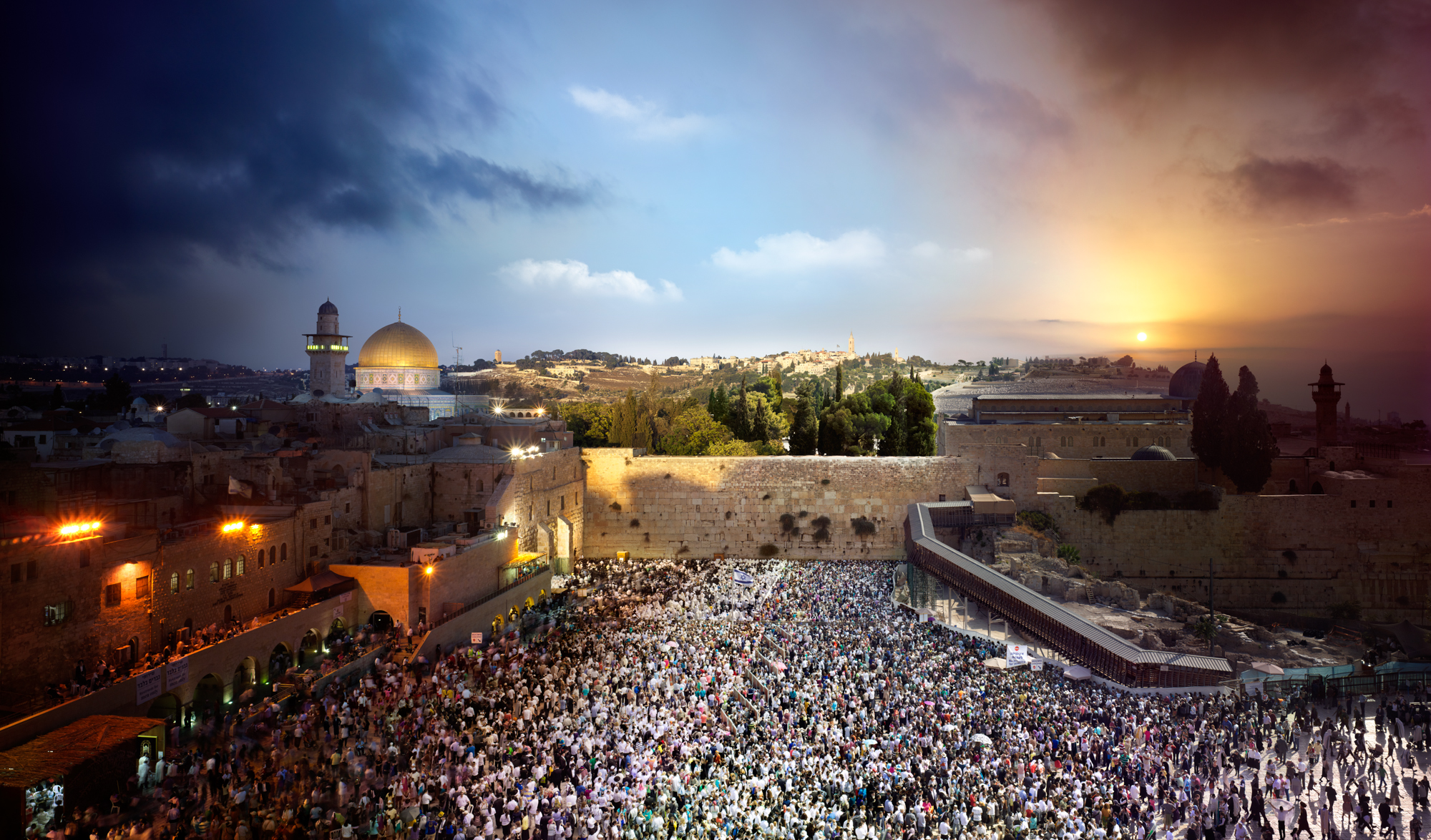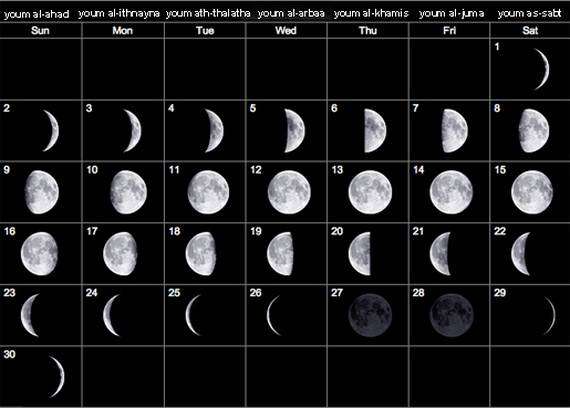بسم الله الرحمن الرحيم
Assalamu Alaikum.
The 10 best days are here.
Now, many people get confused when they hear about “the best ten days” because everyone assumes that this was in Ramadan.
Day = From Fajr to Maghrib.
Night = From Maghrib to Fajr.
The first ten days of Dhul Hijjah are the 10 best days.
The last ten nights of Ramadan are actually the 10 best nights.
Another issue is the fact that Dhul Hijjah isn’t as famous as Ramadan. When a Muslim hears that the ten days of Dhul Hijjah are here, his or her first thought should be:

Instead, the common reaction today is:

Another issue is that many people don’t seem to realise that Dhul Hijjah isn’t just another min-Ramadan but rather has some actions exclusive to it.
Yet another issue is that this lack of awareness about Dhul Hijjah means that it is very difficult for many people to benefit from them compared to Ramadan, where the whole Ummah is into it (and frankly speaking that makes things SO much easier).
So here’s a summary of their virtues and differences (in a pictorial summaryesque way obviously, because I seem to be amongst the few left that likes to read multi-volume books) along with all the relevant proofs.
COMPARING THE MONTHS
Here’s what the Islamic calendar looks like so as to make it easier for you to visualise things:
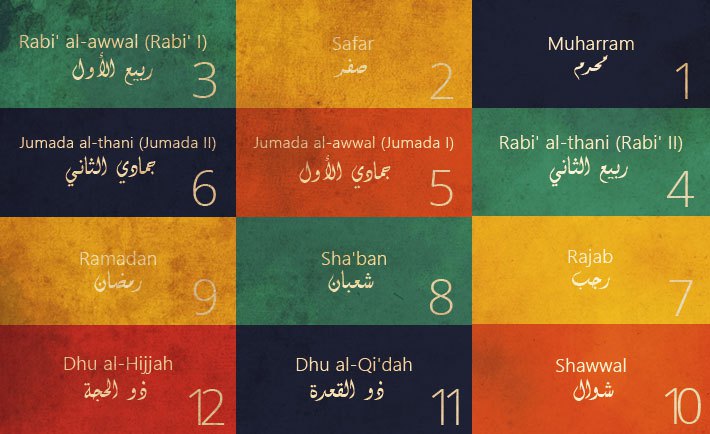
Now, let’s start with a general look at each month and their main virtues.
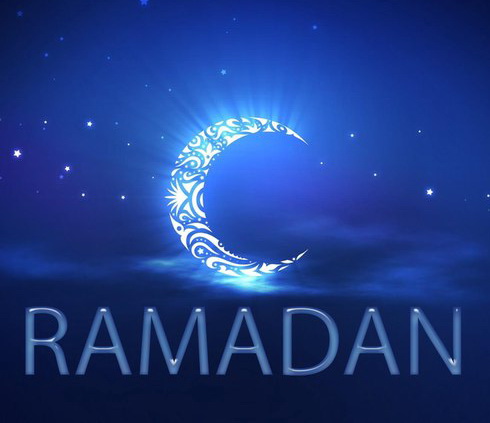
So, what are the virtues of Ramadan? Well, they are too many to list here. Here are a few:
-
The Quran was revealed in it
شَهْرُ رَمَضَانَ الَّذِي أُنزِلَ فِيهِ الْقُرْآنُ هُدًى لِّلنَّاسِ وَبَيِّنَاتٍ مِّنَ الْهُدَىٰ وَالْفُرْقَانِ
The month of Ramadan in which was revealed the Quran, a guidance for mankind and clear proofs for the guidance and the criterion (between right and wrong). [Surah Al-Baqarah (2) : 185]
2. Fasting in it is one of the pillars of Islam
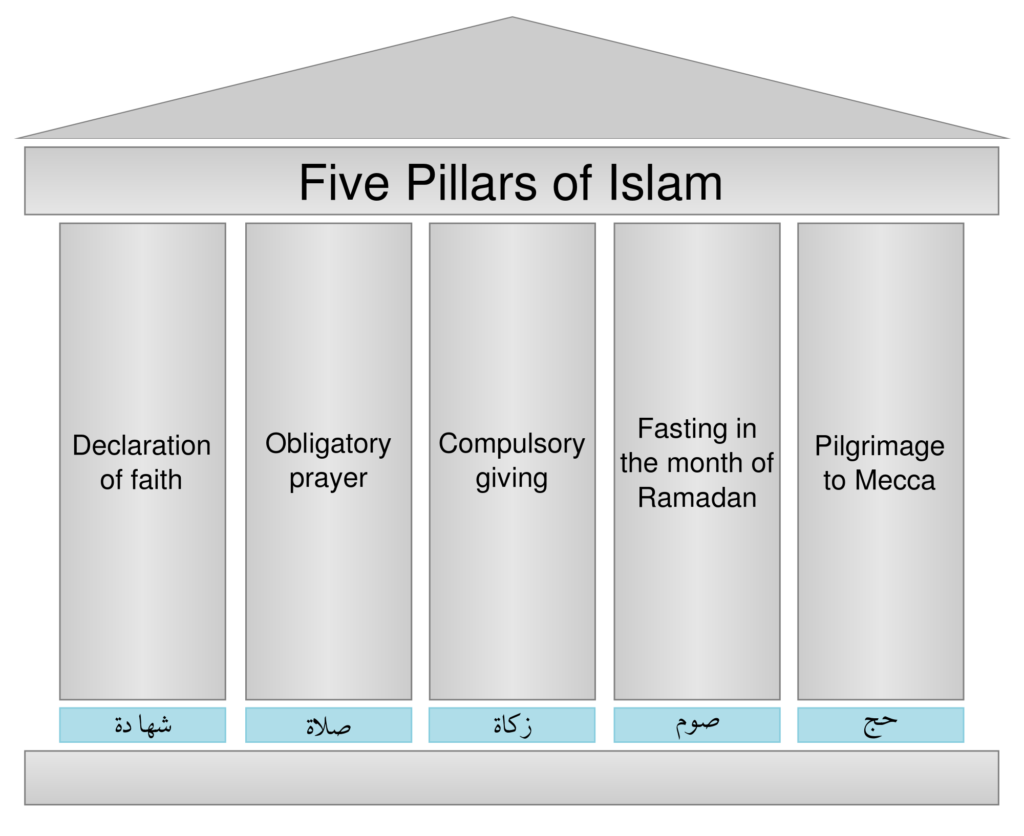
عَنِ ابْنِ عُمَرَ، عَنِ النَّبِيِّ صلى الله عليه وسلم قَالَ : بُنِيَ الإِسْلاَمُ عَلَى خَمْسَةٍ عَلَى أَنْ يُوَحَّدَ اللَّهُ وَإِقَامِ الصَّلاَةِ وَإِيتَاءِ الزَّكَاةِ وَصِيَامِ رَمَضَانَ وَالْحَجِّ
It is narrated on the authority of (Abdullah) the son of Umar (radiallahu anhuma) that the Prophet (sallallahu alaihi wasallam) said: “Islam is built on five (pillars): the tawheed of Allah, the establishment of prayer, payment of zakaah, the fast of Ramadan, and the Hajj.” [Sahih Muslim, Hadeeth No. 18]
3. Its last ten nights are the best nights of the year
The virtues of these will be discussed in the next section, in shaa Allah.
4. Just one Ramadan can make a big difference to your level in the Hereafter
عَنْ طَلْحَةَ بْنِ عُبَيْدِ اللَّهِ، أَنَّ رَجُلَيْنِ، مِنْ بَلِيٍّ قَدِمَا عَلَى رَسُولِ اللَّهِ ـ صلى الله عليه وسلم ـ وَكَانَ إِسْلاَمُهُمَا جَمِيعًا فَكَانَ أَحَدُهُمَا أَشَدَّ اجْتِهَادًا مِنَ الآخَرِ فَغَزَا الْمُجْتَهِدُ مِنْهُمَا فَاسْتُشْهِدَ ثُمَّ مَكَثَ الآخَرُ بَعْدَهُ سَنَةً ثُمَّ تُوُفِّيَ . قَالَ طَلْحَةُ فَرَأَيْتُ فِي الْمَنَامِ بَيْنَا أَنَا عِنْدَ بَابِ الْجَنَّةِ إِذَا أَنَا بِهِمَا فَخَرَجَ خَارِجٌ مِنَ الْجَنَّةِ فَأَذِنَ لِلَّذِي تُوُفِّيَ الآخِرَ مِنْهُمَا ثُمَّ خَرَجَ فَأَذِنَ لِلَّذِي اسْتُشْهِدَ ثُمَّ رَجَعَ إِلَىَّ فَقَالَ ارْجِعْ فَإِنَّكَ لَمْ يَأْنِ لَكَ بَعْدُ . فَأَصْبَحَ طَلْحَةُ يُحَدِّثُ بِهِ النَّاسَ فَعَجِبُوا لِذَلِكَ فَبَلَغَ ذَلِكَ رَسُولَ اللَّهِ ـ صلى الله عليه وسلم ـ . وَحَدَّثُوهُ الْحَدِيثَ فَقَالَ : مِنْ أَىِّ ذَلِكَ تَعْجَبُونَ . فَقَالُوا يَا رَسُولَ اللَّهِ هَذَا كَانَ أَشَدَّ الرَّجُلَيْنِ اجْتِهَادًا ثُمَّ اسْتُشْهِدَ وَدَخَلَ هَذَا الآخِرُ الْجَنَّةَ قَبْلَهُ . فَقَالَ رَسُولُ اللَّهِ ـ صلى الله عليه وسلم ـ أَلَيْسَ قَدْ مَكَثَ هَذَا بَعْدَهُ سَنَةً . قَالُوا بَلَى . قَالَ : وَأَدْرَكَ رَمَضَانَ فَصَامَهُ وَصَلَّى كَذَا وَكَذَا مِنْ سَجْدَةٍ فِي السَّنَةِ . قَالُوا بَلَى قَالَ رَسُولُ اللَّهِ ـ صلى الله عليه وسلم ـ : فَمَا بَيْنَهُمَا أَبْعَدُ مِمَّا بَيْنَ السَّمَاءِ وَالأَرْضِ
It was narrated from Talhah ibn Ubaidillah (radiallahu anhu) that two men from Bali came to the Messenger of Allah (sallallahu alaihi wasallam). They had become Muslim together, but one of them used to strive harder than the other. The one who used to strive harder went out to fight and was martyred. The other one stayed for a year longer, then he passed away. Talhah said: “I saw in a dream that I was at the gate of Paradise and I saw them (those two men). Someone came out of Paradise and admitted the one who had died last, then he came out and admitted the one who had been martyred. Then he came back to me and said: ‘Go back, for your time has not yet come.’” The next morning, Talhah told the people of that and they were amazed. News of that reached the Messenger of Allah (sallallahu alaihi wasallam) and they told him the story. He said: “Why are you so amazed at that?” They said: “O Messenger of Allah, the first one was the one who strove harder, then he was martyred, but the other one was admitted to Paradise before him. The Messenger of Allah (sallallahu alaihi wasallam) said: “Did he not stay behind for a year?” They said: “Yes.” He said: “And did not Ramadan come and he fasted, and he offered such and such prayers during that year?” They said: “Yes.” The Messenger of Allah (sallallahu alaihi wasallam) said: “The difference between them is greater than the difference between heaven and earth.” [Sunan Ibn Majah, Hadeeth No. 3925. Graded “sahih” (authentic) by Al-Albani.]
5. This is an excellent chance to get saved from the Fire

عَنْ أَبِي هُرَيْرَةَ، ـ رضى الله عنه ـ قَالَ قَالَ رَسُولُ اللَّهِ صلى الله عليه وسلم : إِذَا دَخَلَ رَمَضَانُ فُتِّحَتْ أَبْوَابُ الْجَنَّةِ، وَغُلِّقَتْ أَبْوَابُ جَهَنَّمَ، وَسُلْسِلَتِ الشَّيَاطِينُ
Narrated Abu Hurairah (radiallahu anhu): Allah’s Messenger (sallallahu alaihi wasallam) said, “When the month of Ramadan comes, the gates of Paradise are opened and the gates of the (Hell) Fire are closed, and the devils are chained.” [Sahih Al-Bukhari, Volume 4, Hadeeth No. 497]
عَنْ جَابِرٍ، قَالَ قَالَ رَسُولُ اللَّهِ ـ صلى الله عليه وسلم ـ إِنَّ لِلَّهِ عِنْدَ كُلِّ فِطْرٍ عُتَقَاءَ وَذَلِكَ فِي كُلِّ لَيْلَةٍ
It was narrated from Jaabir (radiallahu anhu) that the Messenger of Allah (sallallahu alaihi wasallam) said: “At every breaking of the fast, Allah has people whom He frees (from the Fire), and that happens every night.” [Sunan Ibn Majah, Hadeeth No. 1643. Graded “hasan sahih” (authentic) by Al-Albani.]
عَنْ أبي سعيد الخدري رضي الله عنه قال : قال رسول الله صلى الله عليه وسلم إنَّ للهِ تبارك و تعالى عُتقاءَ في كلِّ يومٍ و ليلةٍ ( يعني في رمضانَ ) . و إنَّ لكلِّ مسلمٍ في كلِّ يومٍ وليلةٍ دعوةٌ مُستجابةٌ
Abu Saeed said (radiallahu anhu): The Messenger of Allah (sallallahu alaihi wasallam) said: “Allah has people whom He redeems every day and night – meaning in Ramadaan – and every Muslim every day and night has a supplication that is answered.” [Sahih At-Targheeb wat-Tarheeb, Hadeeth No. 1002]
For more virtues of Ramadan, please refer to the “How to Enjoy Ramadan” series [Parts 1 and 2.]
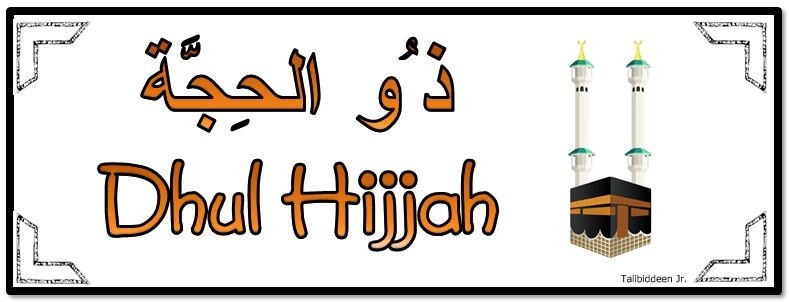
What about the virtues of Dhul Hijjah?
-
It is one of the sacred months
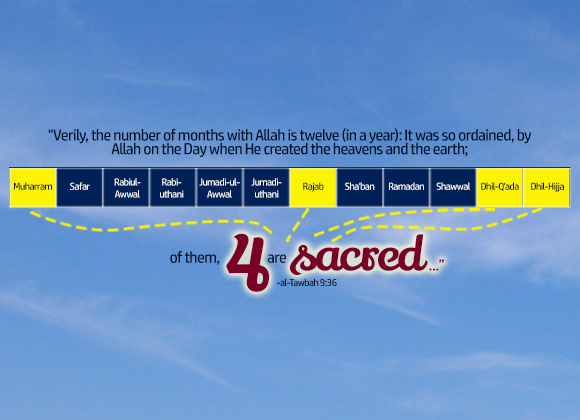
إِنَّ عِدَّةَ الشُّهُورِ عِندَ اللَّـهِ اثْنَا عَشَرَ شَهْرًا فِي كِتَابِ اللَّـهِ يَوْمَ خَلَقَ السَّمَاوَاتِ وَالْأَرْضَ مِنْهَا أَرْبَعَةٌ حُرُمٌ ۚ ذَٰلِكَ الدِّينُ الْقَيِّمُ ۚ فَلَا تَظْلِمُوا فِيهِنَّ أَنفُسَكُمْ ۚ وَقَاتِلُوا الْمُشْرِكِينَ كَافَّةً كَمَا يُقَاتِلُونَكُمْ كَافَّةً ۚ وَاعْلَمُوا أَنَّ اللَّـهَ مَعَ الْمُتَّقِينَ
Verily, the number of months with Allah is twelve months (in a year), so was it ordained by Allah on the Day when He created the heavens and the earth; of them four are Sacred, (i.e. the 1st, the 7th, the 11th and the 12th months of the Islamic calendar). That is the right religion, so wrong not yourselves therein, and fight against the Mushrikoon (polytheists, pagans, idolaters, disbelievers in the Oneness of Allah) collectively, as they fight against you collectively. But know that Allah is with those who are Al-Muttaqoon (the pious). [Surah At-Tawbah (9) : 36]
عَنْ أَبِي بَكْرَةَ، عَنِ النَّبِيِّ صلى الله عليه وسلم قَالَ : إِنَّ الزَّمَانَ قَدِ اسْتَدَارَ كَهَيْئَتِهِ يَوْمَ خَلَقَ اللَّهُ السَّمَوَاتِ وَالأَرْضَ، السَّنَةُ اثْنَا عَشَرَ شَهْرًا مِنْهَا، أَرْبَعَةٌ حُرُمٌ، ثَلاَثٌ مُتَوَالِيَاتٌ، ذُو الْقَعْدَةِ وَذُو الْحِجَّةِ وَالْمُحَرَّمُ وَرَجَبُ مُضَرَ الَّذِي بَيْنَ جُمَادَى وَشَعْبَانَ
Narrated Abu Bakrah (radiallahu anhu): The Prophet (sallallahu alaihi wasallam) said, “Time has come back to its original state which it had when Allah created the Heavens and the Earth; the year is twelve months, four of which are sacred. Three of them are in succession; Dhul-Qaadah, Dhul-Hijjah and Al-Muharram, and (the fourth being) Rajab Mudar (named after the tribe of Mudar as they used to respect this month) which stands between Jumad (ath-thani) and Shaban.” [Sahih Al-Bukhari, Volume 6, Hadeeth No. 184]
What does “sacred months” mean exactly and why were these four months chosen?
Imam Ibn Kathir (rahimahullah) says in his explanation of this verse:
The Prophet said: (Three are in succession; Dhul-Qadah, Dhul-Hijjah and Muharram, and (the fourth is) Rajab of (the tribe of) Mudar which comes between Jumada (Ath-Thani)﴾and Shaban). The Prophet said “Rajab of Mudar” to attest to the custom of Mudar, in saying that Rajab is the month that is between Jumada and Shaban, not as the tribe of Rabiah thought, that it is between Shaban and Shawwal, which is Ramadan in the present calendar. The four Sacred Months were made four, three in succession and one alone, so that the Hajj and Umrah are performed with ease. Dhul-Qadah, the month before the Hajj month, was made sacred because they refrained from fighting during that month. Dhul-Hijjah, the next month, was made sacred because it is the month of Hajj, during which they performed Hajj rituals. Muharram, which comes next, was made sacred so that they are able to go back to their areas in safety (after performing Hajj). Rajab, in the middle of the lunar year, was made sacred so that those coming from the farthest areas of Arabia are able to perform Umrah and visit the House and then go back to their areas safely. Allah said next,
﴿ذلِكَ الدِّينُ الْقَيِّمُ﴾
(That is the right religion), that is the Straight Law, requiring implementing Allah’s order concerning the months that He made sacred and their true count as it was originally written by Allah. Allah said,
﴿فَلاَ تَظْلِمُواْ فِيهِنَّ أَنفُسَكُمْ﴾
(so wrong not yourselves therein) during these Sacred Months, for sin in them is worse than sin in other months. Likewise, sins in the Sacred City are written multiplied
﴿وَمَن يُرِدْ فِيهِ بِإِلْحَادٍ بِظُلْمٍ نُّذِقْهُ مِنْ عَذَابٍ أَلِيمٍ﴾
(…and whoever inclines to evil actions therein (in Makkah) or to do wrong, him We shall cause to taste from a painful torment) ﴿ [22:25]. Similarly, sin in general is worse during the Sacred Months `Ali bin Abi Talhah narrated that Ibn `Abbas said, Allah’s statement,
﴿إِنَّ عِدَّةَ الشُّهُورِ عِندَ اللَّهِ﴾
(Verily, the number of months with Allah…), is connected to
﴿فَلاَ تَظْلِمُواْ فِيهِنَّ أَنفُسَكُمْ﴾
(so wrong not yourselves therein), “In all (twelve) months. Allah then chose four out of these months and made them sacred, emphasizing their sanctity, making sinning in them greater, in addition to, multiplying rewards of righteous deeds during them.” Qatadah said about Allah’s statement,
﴿فَلاَ تَظْلِمُواْ فِيهِنَّ أَنفُسَكُمْ﴾
(so wrong not yourselves therein), “Injustice during the Sacred Months is worse and graver than injustice in other months. Verily, injustice is always wrong, but Allah makes things graver than others as He will.” He also said, “Allah has chosen some of His creation above others. He chose Messengers from angels and from men. He also chose His Speech above all speech, the Masajid above other areas of the earth, Ramadan and the Sacred Months above all months, Friday above the other days and Laylatul-Qadr (The Night of Decree) above all nights. Therefore, sanctify what Allah has sanctified, for doing so is the practice of people of understanding and comprehension.”
Shaikh Saleh Al-Munajjid says in this article:
These months are called sacred for two reasons:
1- Because fighting therein is forbidden unless initiated by the enemy
2- Because transgression of the sacred limits therein is worse than at other times.
Here’s another article that discusses these months.
Please note that Ramadan IS the greatest of the months but Dhul Hijjah has some virtues that it does not.
2. It is one of the months of Hajj
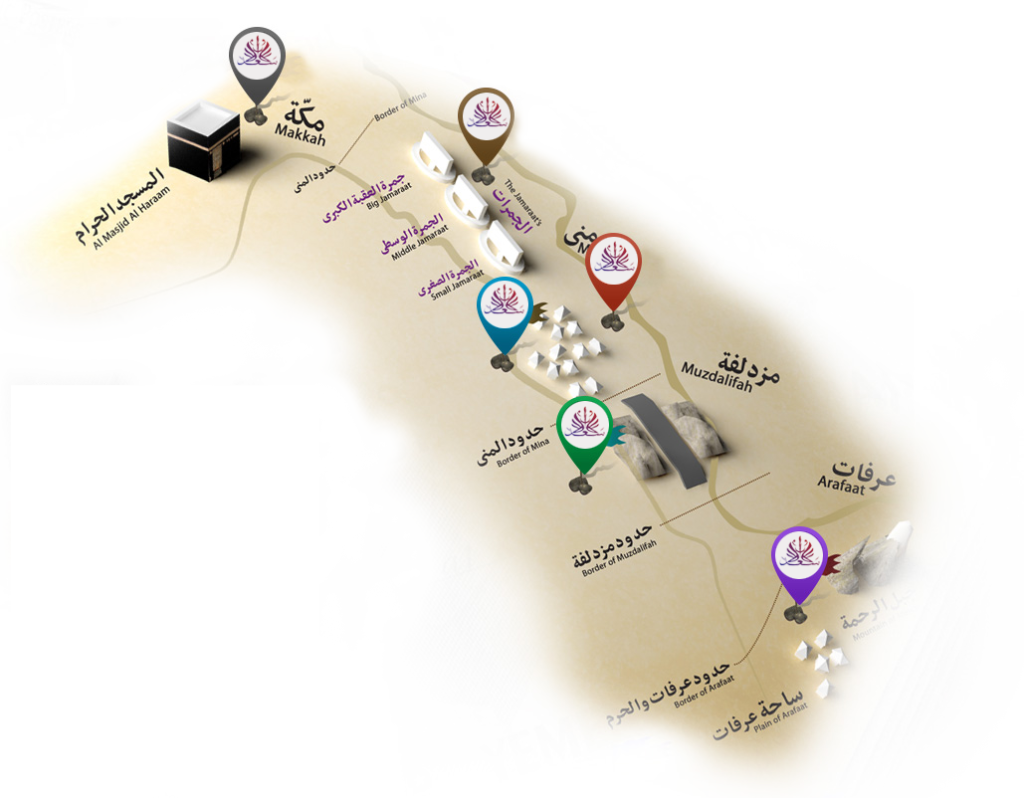
الْحَجُّ أَشْهُرٌ مَّعْلُومَاتٌ ۚ فَمَن فَرَضَ فِيهِنَّ الْحَجَّ فَلَا رَفَثَ وَلَا فُسُوقَ وَلَا جِدَالَ فِي الْحَجِّ ۗ وَمَا تَفْعَلُوا مِنْ خَيْرٍ يَعْلَمْهُ اللَّـهُ ۗ وَتَزَوَّدُوا فَإِنَّ خَيْرَ الزَّادِ التَّقْوَىٰ ۚ وَاتَّقُونِ يَا أُولِي الْأَلْبَابِ
“The Hajj is (in) the well-known (lunar year) months. So whosoever intends to perform Hajj therein by assuming Ihram), then he should not have sexual relations (with his wife), nor commit sin, nor dispute unjustly during the Hajj. And whatever good you do, (be sure) Allah knows it. And take a provision (with you) for the journey, but the best provision is At-Taqwa (piety, righteousness, etc.). So fear Me, O men of understanding!” [Surah Al-Baqarah (2):197]
“The well-known months” means Shawwal, Dhul Qaddah and the first ten days of Dhul Hijjah. The one who wants to do Hajj can only assume ihram at this time, not before it or after it.
[I recently heard a scholar point out that there is a dispute about whether the entire Dhul Hijjah is also a month of Hajj or whether it is just the first ten days. Allah knows better. I should also point out that the 11th, 12th and 13th of Dhul Hijjah are also the days of Hajj as the pilgrims stay in Mina and stone the Jamraat (pillars) on these days.]
3. Its first ten days are the best days of the year
The virtues of these days will be discussed in the next section.
4. It contains the Day of Eid Al-Adha and the Days of Tashreeq
Eid Al-Adha is the 10th of Dhul Hijjah, and therefore part of the first 10 days. The Days of Tashreeq are the three days after that i.e. the 11th, 12th and 13th of Dhul Hijjah. Although they come after the 10 days, these 3 days also have some virtues.
عَنْ عَبْدِ اللَّهِ بْنِ قُرْطٍ، عَنِ النَّبِيِّ صلى الله عليه وسلم قَالَ : إِنَّ أَعْظَمَ الأَيَّامِ عِنْدَ اللَّهِ تَبَارَكَ وَتَعَالَى يَوْمُ النَّحْرِ ثُمَّ يَوْمُ الْقَرِّ . قَالَ عِيسَى قَالَ ثَوْرٌ وَهُوَ الْيَوْمُ الثَّانِي . قَالَ وَقُرِّبَ لِرَسُولِ اللَّهِ صلى الله عليه وسلم بَدَنَاتٌ خَمْسٌ أَوْ سِتٌّ فَطَفِقْنَ يَزْدَلِفْنَ إِلَيْهِ بِأَيَّتِهِنَّ يَبْدَأُ فَلَمَّا وَجَبَتْ جُنُوبُهَا – قَالَ فَتَكَلَّمَ بِكَلِمَةٍ خَفِيَّةٍ لَمْ أَفْهَمْهَا فَقُلْتُ مَا قَالَ – قَالَ : مَنْ شَاءَ اقْتَطَعَ
Narrated Abdullah ibn Qurt (radiallahu anu): The Prophet (sallallahu alaihi wasallam) said: “The greatest day in Allah’s sight is the day of sacrifice and next the day of resting “, which Isa said on the authority of Thawr is the second day. Five or six sacrificial camels were brought to the Messenger of Allah (sallallahu alaihi wasallam) and they began to draw near to see which he would sacrifice first. When they fell down dead, he said something in a low voice, which I could not catch. So I asked: What did he say? He was told that he had said: Anyone who wants can cut off a piece. [Sunan Abee Dawood, Hadeeth No. 1765. Graded “sahih” (authentic) by Al-Albani.]
Yawm An-Nahr (the Day of Sacrifice) is the 10th of Dhul Hijjah i.e. Eid Al-Adha, and Yawn Al-Qarr (the Day of Resting) is the 11th of Dhul Hijjah.
[There’s an interesting point made under the English translation of this hadeeth (by Darussalam). It says: “Even camels know the high station of the Messenger of Allah (sallallahu alaihi wasallam), and felt honoured to be slaughtered by his blessed hand.” Subhan Allah!]
عن عُقْبَة بْنَ عَامِرٍ، قَالَ قَالَ رَسُولُ اللَّهِ صلى الله عليه وسلم :يَوْمُ عَرَفَةَ وَيَوْمُ النَّحْرِ وَأَيَّامُ التَّشْرِيقِ عِيدُنَا أَهْلَ الإِسْلاَمِ وَهِيَ أَيَّامُ أَكْلٍ وَشُرْبٍ
Narrated Uqbah ibn Amir (radiallahu anhu): The Prophet (sallallahu alaihi wasallam) said: The Day of Arafah, the Day of Sacrifice, the Days of Tashreeq are (the days of) our Eid, the people of Islam and they are the days of eating and drinking. [Sunan Abee Dawood, Hadeeth No. 2419. Graded “sahih” (authentic) by Al-Albani.]
Note: The days of eating and drinking are Eid Al-Adha and the Days of Tashreeq, not the Day of Arafah, which is a great day to fast for those who are NOT in Hajj.
عن نبيشة قال قال رسول الله صلى الله عليه وسلم: أيامُ التشريقِ أيامُ أكْلٍ ، وشُرْبٍ ، وذِكْرِ اللهِ
Nubaishah (radiallahu anhu) said that Allah’s Messenger (sallallahu alaihi wasallam) said: “The days of Tashreeq are days of eating, drinking and Dhikr (remembering) of Allah.” [Sahih Al-Jaami, Hadeeth No. 2689]
The Days of Tashreeq have also been mentioned in the Quran.
وَاذْكُرُوا اللَّـهَ فِي أَيَّامٍ مَّعْدُودَاتٍ
And remember Allah during the appointed Days. [Surah Al-Baqarah (2) : 203]
This refers to the Days of Tashreeq according to many of the scholars. [The quote of Ibn Abbas (radiallahu anhu) regarding this verse is mentioned below.]
5. This is an excellent chance to get saved from the Fire
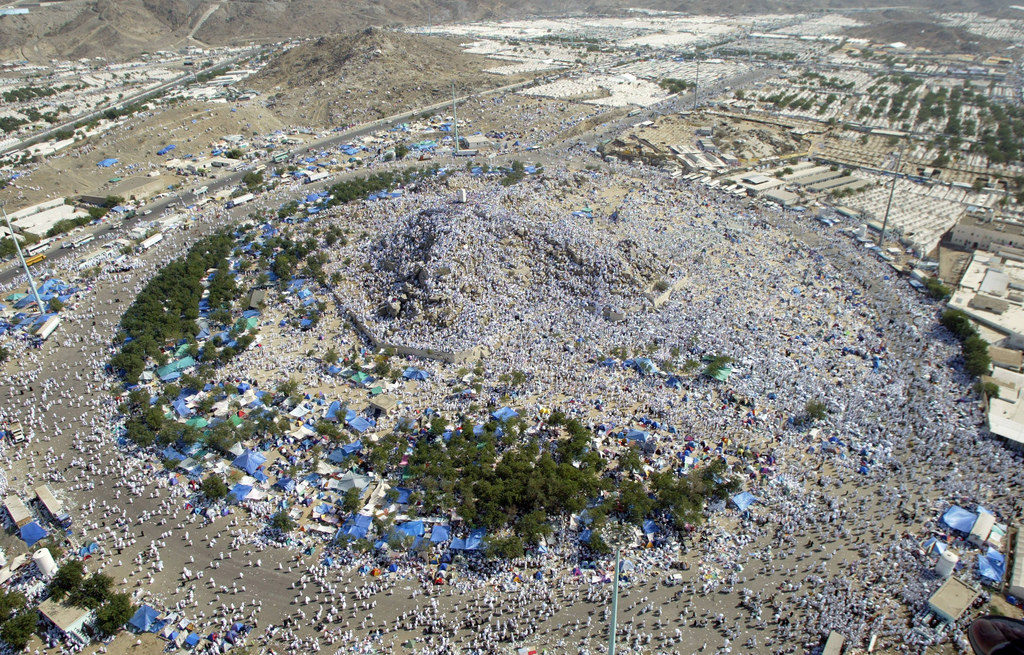
The Day of Arafah, the 9th of this month, is when many people are saved from the Fire.
عَن عَائِشَة قَالَتْ إِنَّ رَسُولَ اللَّهِ صلى الله عليه وسلم قَالَ : مَا مِنْ يَوْمٍ أَكْثَرَ مِنْ أَنْ يُعْتِقَ اللَّهُ فِيهِ عَبْدًا مِنَ النَّارِ مِنْ يَوْمِ عَرَفَةَ وَإِنَّهُ لَيَدْنُو ثُمَّ يُبَاهِي بِهِمُ الْمَلاَئِكَةَ فَيَقُولُ مَا أَرَادَ هَؤُلاَءِ
Aishah (radiallahu anhu) reported Allah’s Messenger (sallallahu alaihi wasallam) as saying: There is no day when Allah sets free more servants from Hell than the Day of Arafah. He draws near, then praises them to the angels, saying: What do these want? [Sahih Muslim, Hadeeth No. 3126]

COMPARING THE TEN DAYS OF EACH
Let’s compare the ten days of each month.
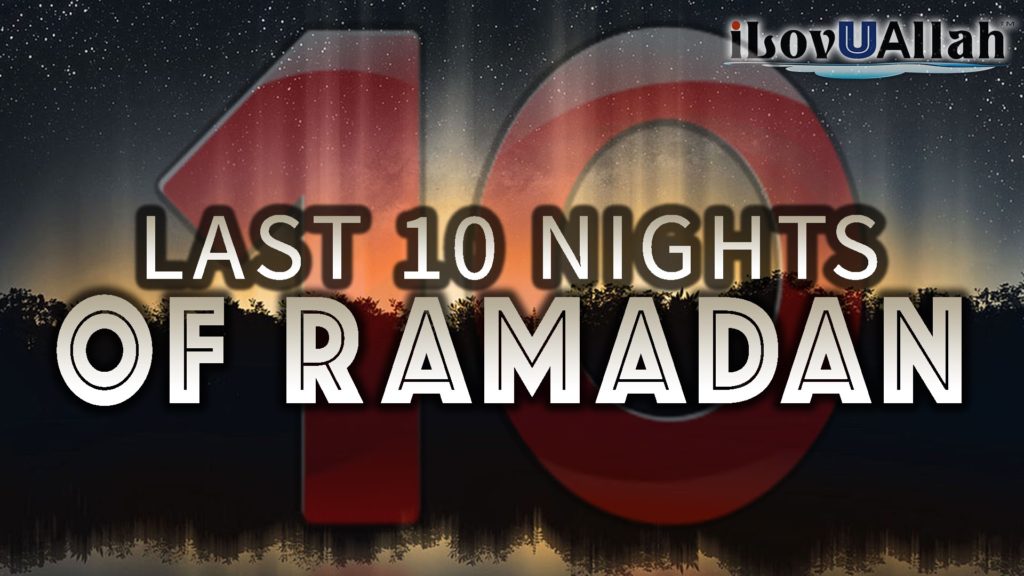
-
Laylatul Qadr (the night that the Quran was revealed) falls in the last ten nights
عَنْ ابْنَ عُمَرَ، – رضى الله عنهما -قال: قَالَ رَسُولُ اللَّهِ صلى الله عليه وسلم : الْتَمِسُوهَا فِي الْعَشْرِ الأَوَاخِرِ – يَعْنِي لَيْلَةَ الْقَدْرِ – فَإِنْ ضَعُفَ أَحَدُكُمْ أَوْ عَجَزَ فَلاَ يُغْلَبَنَّ عَلَى السَّبْعِ الْبَوَاقِي
Ibn Umar (radiallahu anhuma) reported Allah’s Messenger (sallallahu alaihi wasallam) as saying: “Seek it (Lailat-ul-Qadr) in the last ten (nights). If one among you shows slackness and weakness (in the earlier part of Ramadan), it should not be allowed to prevail upon him in the last week.“ [Sahih Muslim, Hadeeth No. 2621]
The virtues of Laylatul Qadr are mentioned below.
2. The Prophet (sallallahu alaihi wasallam) used to pray the whole night in these last ten nights
عَنْ عَائِشَةَ ـ رضى الله عنها ـ قَالَتْ كَانَ النَّبِيُّ صلى الله عليه وسلم إِذَا دَخَلَ الْعَشْرُ شَدَّ مِئْزَرَهُ، وَأَحْيَا لَيْلَهُ، وَأَيْقَظَ أَهْلَهُ
Narrated Aishah (radiallahu anha): “With the start of the last ten days of Ramadan, the Prophet (sallallahu alaihi wasallam) used to tighten his waist belt (i.e. work hard) and used to pray all the night, and used to keep his family awake for the prayers.” [Sahih Al-Bukhari, Volume 3, Hadeeth No. 241]
3. The Prophet (sallallahu alaihi wasallam) used to do itikaf (staying in the masjid) in the last ten days
عَنْ عَائِشَةَ ـ رضى الله عنها ـ زَوْجِ النَّبِيِّ صلى الله عليه وسلم أَنَّ النَّبِيَّ صلى الله عليه وسلم كَانَ يَعْتَكِفُ الْعَشْرَ الأَوَاخِرَ مِنْ رَمَضَانَ حَتَّى تَوَفَّاهُ اللَّهُ، ثُمَّ اعْتَكَفَ أَزْوَاجُهُ مِنْ بَعْدِهِ
Narrated Aishah (radiallahu anha): “The Prophet (salallahu alaihi wasallam) used to practice itikaaf in the last ten days of Ramadan until he died and then his wives used to practice Itikaf after him.” [Sahih Al-Bukhari, Volume No. 3, Hadeeth No. 243]
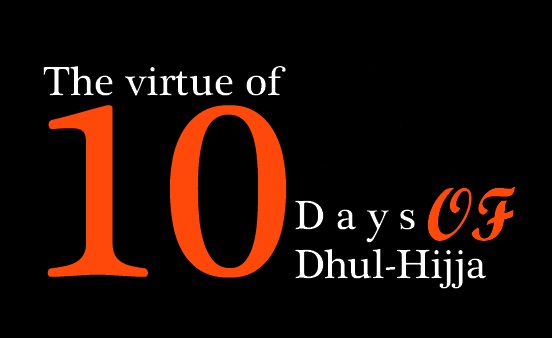
-
These ten days are the best days in this life
عن جابر قال: قَالَ رَسُولُ اللَّهِ صلى الله عليه وسلم: أفضلُ أيامِ الدنيا أيامُ العشْرِ
Jaabir (radiallahu anhu) said: The Messenger of Allah said: The best days in this (wordly) life are the ten days (i.e. the first ten days of Dhul Hijjah).” [Sahih Al-Jaami, Hadeeth No. 1133]
2. Deeds done in these ten days are superior to deeds done in other than them
عَنِ ابْنِ عَبَّاسٍ، عَنِ النَّبِيِّ صلى الله عليه وسلم أَنَّهُ قَالَ : مَا الْعَمَلُ فِي أَيَّامِ الْعَشْرِ أَفْضَلَ مِنَ الْعَمَلِ فِي هَذِهِ ”قَالُوا وَلاَ الْجِهَادُ قَالَ ” وَلاَ الْجِهَادُ، إِلاَّ رَجُلٌ خَرَجَ يُخَاطِرُ بِنَفْسِهِ وَمَالِهِ فَلَمْ يَرْجِعْ بِشَىْءٍ
Narrated Ibn Abbas (radiallahu anhuma): The Prophet (sallallahu alaihi wasallam) said, “No good deeds done on other days are superior to those done on these (first ten days of Dhul Hijjah).” Then some companions of the Prophet (sallallahu alaihi wasallam) said, “Not even Jihad?” He replied, “Not even Jihad, except that of a man who does it by putting himself and his property in danger (for Allah’s sake) and does not return with any of those things.” [Sahih Al-Bukhari, Volume 2, Hadeeth No. 86]
The deeds done on these days are very beloved to Allah.
عَنِ ابْنِ عَبَّاسٍ، قَالَ قَالَ رَسُولُ اللَّهِ صلى الله عليه وسلم : مَا مِنْ أَيَّامٍ الْعَمَلُ الصَّالِحُ فِيهِنَّ أَحَبُّ إِلَى اللَّهِ مِنْ هَذِهِ الأَيَّامِ الْعَشْرِ . فَقَالُوا يَا رَسُولَ اللَّهِ وَلاَ الْجِهَادُ فِي سَبِيلِ اللَّهِ فَقَالَ رَسُولُ اللَّهِ صلى الله عليه وسلم :وَلاَ الْجِهَادُ فِي سَبِيلِ اللَّهِ إِلاَّ رَجُلٌ خَرَجَ بِنَفْسِهِ وَمَالِهِ فَلَمْ يَرْجِعْ مِنْ ذَلِكَ بِشَيْءٍ
Ibn Abbas narrated that the Messenger of Allah said: “There are no days in which righteous deeds are more beloved to Allah than those ten days.” They said: “O Messenger of Allah! Not even Jihad in Allah Cause?” The Messenger of Allah said: “Not even Jihad in Allah’s Cause, unless a man were to out with his self and his wealth and not return from that with anything.” [Jaami At-Tirmidhi, Hadeeth No. 757. Graded “sahih” (authentic) by Al-Albani.]
3. Allah swore by these days
This shows us that they are great days.
وَلَيَالٍ عَشْرٍ
By the ten nights. [Surah Al-Fajr (89) : 2]
Ibn Kathir said in his explanation of this verse:
“‘The ten nights’ refers to the (first) ten days of Dhul-Hijjah. This was said by Ibn Abbas, Ibn Zubayr, Mujahid and others among the Salaf and the latter generations”
Also, Allah asked us to mention His Name during these days.
وَيَذْكُرُوا اسْمَ اللَّـهِ فِي أَيَّامٍ مَّعْلُومَاتٍ
And mention the Name of Allah on the known days. [Surah Al-Hajj (22) : 28]
Imam Ibn Kathir says in his explanation of Surah Al-Baqarah, Verse 203:
“Ibn Abbas said, “The Appointed Days are the Days of Tashreeq (11-12-13th of Dhul-Hijjah) while the Known Days are the (first) ten (days of Dhul-Hijjah).””
4. These days have been mentioned in Musa’s (alaihissalam) story (in the Quran)
وَإِذْ وَاعَدْنَا مُوسَىٰ أَرْبَعِينَ لَيْلَةً ثُمَّ اتَّخَذْتُمُ الْعِجْلَ مِن بَعْدِهِ وَأَنتُمْ ظَالِمُونَ
And (remember) when We appointed for Musa (Moses) forty nights, and (in his absence) you took the calf (for worship), and you were dhalimoon (polytheists and wrong-doers, etc.). [Surah Al-Baqarah (2) : 51]
وَوَاعَدْنَا مُوسَىٰ ثَلَاثِينَ لَيْلَةً وَأَتْمَمْنَاهَا بِعَشْرٍ فَتَمَّ مِيقَاتُ رَبِّهِ أَرْبَعِينَ لَيْلَةً
And We appointed for Musa thirty nights and added (to the period) ten (more), and he completed the term, appointed by his Lord, of forty nights. [Surah Al-Araaf (7) : 142]
Ibn Kathir says in his explanation of Surah Al-Baqarah, Verse 51:
“It was said that these days were during the month of Dhul-Qadah plus the first ten days in Dhul-Hijjah, after the Children of Israel were delivered from Firawn and they safely crossed the sea.”

THE NIGHT OF QADR VS. THE DAY OF ARAFAH
Now, the best night out of all the nights of Ramadan is Laylatul Qadr. However, the actual date of the night is unknown. All we know is that it falls on the last ten nights and that there is more chance of it falling on an odd night.
As for Dhul Hijjah, the best day is Eid Al Adha as mentioned above. However, from the first nine days, the Day of Arafah is the best one.
So, I thought I would mention the virtues of both Laylatul Qadr and the Day of Arafah as the former is a night of worship and a lot of reward and the latter is a day of worship and a lot of reward.
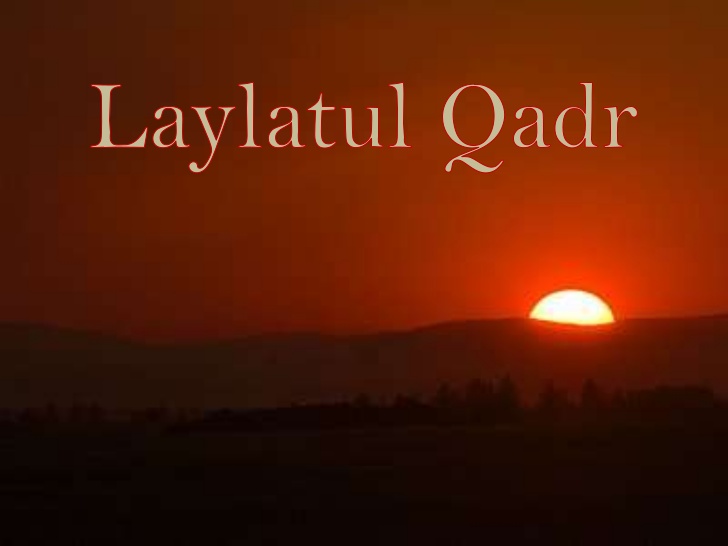
-
The Quran was revealed on this day
إِنَّا أَنزَلْنَاهُ فِي لَيْلَةِ الْقَدْرِ
Verily! We have sent it (this Quran) down in the night of Al-Qadr (Decree). [Surah Al-Qadr (97) : 1]
What does the Quran being revealed on this day actually mean? Well, I wrote an entire article about that already.
2. A whole surah was revealed regarding it
إِنَّا أَنزَلْنَاهُ فِي لَيْلَةِ الْقَدْرِ
وَمَا أَدْرَاكَ مَا لَيْلَةُ الْقَدْرِ
لَيْلَةُ الْقَدْرِ خَيْرٌ مِّنْ أَلْفِ شَهْرٍ
نَزَّلُ الْمَلَائِكَةُ وَالرُّوحُ فِيهَا بِإِذْنِ رَبِّهِم مِّن كُلِّ أَمْرٍ
سَلَامٌ هِيَ حَتَّىٰ مَطْلَعِ الْفَجْرِ
Verily! We have sent it (this Quran) down in the night of Al-Qadr (Decree). And what will make you know what the night of Al-Qadr (Decree) is? The night of Al-Qadr (Decree) is better than a thousand months (i.e. worshipping Allah in that night is better than worshipping Him a thousand months, i.e. 83 years and 4 months). Therein descend the angels and the Rooh [Jibreel] by Allah’s Permission with all Decrees, Peace! (All that night, there is Peace and Goodness from Allah to His believing slaves) until the appearance of dawn. [Surah Al-Qadr (97) : 1-5]
3. Worship in it is better than a thousand months
لَيْلَةُ الْقَدْرِ خَيْرٌ مِّنْ أَلْفِ شَهْرٍ
The night of Al-Qadr (Decree) is better than a thousand months (i.e. worshipping Allah in that night is better than worshipping Him a thousand months, i.e. 83 years and 4 months). [Surah Al-Qadr (97) : 3]
عَنْ أَنَسِ بْنِ مَالِكٍ، قَالَ دَخَلَ رَمَضَانُ فَقَالَ رَسُولُ اللَّهِ ـ صلى الله عليه وسلم ـ : إِنَّ هَذَا الشَّهْرَ قَدْ حَضَرَكُمْ وَفِيهِ لَيْلَةٌ خَيْرٌ مِنْ أَلْفِ شَهْرٍ مَنْ حُرِمَهَا فَقَدْ حُرِمَ الْخَيْرَ كُلَّهُ وَلاَ يُحْرَمُ خَيْرَهَا إِلاَّ مَحْرُومٌ
It was narrated that Anas bin Malik (radiallahu anhu) said: “Ramadan began, and the Messenger of Allah (sallallahu alaihi wasallam) said: ‘This month has come to you, and in it there is a night that is better than a thousand months. Whoever is deprived of it is deprived of all goodness, and no one is deprived of its goodness except one who is truly deprived.’” [Sunan Ibn Majah, Hadeeth No. 1644. Graded “hasan sahih” (authentic) by Al-Albani.]
4. The angels descend on this night
نَزَّلُ الْمَلَائِكَةُ وَالرُّوحُ فِيهَا بِإِذْنِ رَبِّهِم مِّن كُلِّ أَمْرٍ
Therein descend the angels and the Rooh [Jibreel] by Allah’s Permission with all Decrees [Surah Al-Qadr (97) : 3]
Ibn Kathir says in his explanation of this verse:
“The angels descend in abundance during the Night of Al-Qadr due to its abundant blessings. The angels descend with the descending of blessings and mercy, just as they descend when the Quran is recited, they surround the circles of Dhikr (remembrance of Allah) and they lower their wings with true respect for the student of knowledge. In reference to Ar-Ruh, it is said that here it means the angel Jibreel. Therefore, the wording of the Ayah (verse) is a method of adding the name of the distinct object (in this case Jibreel) separate from the general group (in this case the angels).”
5. There is peace until dawn
سَلَامٌ هِيَ حَتَّىٰ مَطْلَعِ الْفَجْرِ
Peace! (All that night, there is Peace and Goodness from Allah to His believing slaves) until the appearance of dawn. [Surah Al-Qadr (97) : 5]
Ibn Kathir says in his explanation of this verse:
“Said bin Mansur said, Isa bin Yunus told us that Al-Amash narrated to them that Mujahid said concerning Allah’s statement,
﴿سَلَـمٌ هِىَ﴾
(There is peace) “It is security in which Shaytan cannot do any evil or any harm.”
and he says:
“Then Allah says,
﴿سَلَـمٌ هِىَ حَتَّى مَطْلَعِ الْفَجْرِ ﴾
(There is peace until the appearance of dawn.) Said bin Mansur said, “Hushaym narrated to us on the authority of Abu Ishaq, who narrated that Ash-Shabi said concerning Allah’s statement,
﴿تَنَزَّلُ الْمَلَـئِكَةُ وَالرُّوحُ فِيهَا بِإِذْنِ رَبِّهِم مِّن كُلِّ أَمْرٍ
سَلَـمٌ هِىَ حَتَّى مَطْلَعِ الْفَجْرِ﴾
(Therein descend the angels and the Ruh by their Lord’s permission with every matter, there is a peace until the appearance of dawn.) The angels giving the greetings of peace during the Night of Al-Qadr to the people in the Masjids until the coming of Fajr (dawn).”’ Qatadah and Ibn Zayd both said concerning Allah’s statement,
﴿سَلَـمٌ هِىَ﴾
(There is peace.) “This means all of it is good and there is no evil in it until the coming of Fajr (dawn).””
I recall something I had heard in a lecture a long time ago. The brother pointed out that Jibreel (alaihissalam) doesn’t descend anymore on a regular basis because the Prophethood is over (because he is the Angel of Revelation), so the fact that he descends on this night makes it very special.
6. It is a blessed night
إِنَّا أَنزَلْنَاهُ فِي لَيْلَةٍ مُّبَارَكَةٍ
We sent it (this Quran) down on a blessed night (i.e. night of Qadr). [Surah Ad-Dukhan (44) : 3-6]
7. The decrees of the following year are recorded from Al-Lawh Al-Mahfoodh (The Preserved Tablet)
فِيهَا يُفْرَقُ كُلُّ أَمْرٍ حَكِيمٍ
أَمْرًا مِّنْ عِندِنَا ۚ إِنَّا كُنَّا مُرْسِلِينَ
رَحْمَةً مِّن رَّبِّكَ ۚ إِنَّهُ هُوَ السَّمِيعُ الْعَلِيمُ
Therein (that night) is decreed every matter of ordainments. Amran (i.e. a Command or this Quran or the Decree of every matter) from Us. Verily, We are ever sending (the Messengers), (As) a Mercy from your Lord. Verily! He is the All-Hearer, the All-Knower. [Surah Ad-Dukhan (44) : 4-6]
Those who want to understand this part better should refer to this earlier article.
8. Establishing prayers on it causes sins to be forgiven
عَنْ أَبِي هُرَيْرَةَ ـ رضى الله عنه ـ عَنِ النَّبِيِّ صلى الله عليه وسلم قَالَ : مَنْ قَامَ لَيْلَةَ الْقَدْرِ إِيمَانًا وَاحْتِسَابًا غُفِرَ لَهُ مَا تَقَدَّمَ مِنْ ذَنْبِهِ، وَمَنْ صَامَ رَمَضَانَ إِيمَانًا وَاحْتِسَابًا غُفِرَ لَهُ مَا تَقَدَّمَ مِنْ ذَنْبِهِ
Narrated Abu Hurairah (radiallahu anhu): The Prophet (sallallahu alaihi wasallam) said, “Whoever established prayers on Laylatul Qadr out of sincere faith and hoping for a reward from Allah, then all his previous sins will be forgiven; and whoever fasts in the month of Ramadan out of sincere faith, and hoping for a reward from Allah, then all his previous sins will be forgiven.” [Sahih Al-Bukhari, Volume 3, Hadeeth No. 125]
9. There is a special dua (supplication) to be said on it
عَنْ عَائِشَةَ، أَنَّهَا قَالَتْ يَا رَسُولَ اللَّهِ أَرَأَيْتَ إِنْ وَافَقْتُ لَيْلَةَ الْقَدْرِ مَا أَدْعُو قَالَ : تَقُولِينَ اللَّهُمَّ إِنَّكَ عَفُوٌّ تُحِبُّ الْعَفْوَ فَاعْفُ عَنِّي
It was narrated from Aishah (radiallahu anhu) that she said: “O Messenger of Allah, what do you think I should say in my supplication, if I come upon Laylatul-Qadr?” He (sallallahu alaihi wasallam) said: “Say: ‘Allahumma innaka afuwwun tuhibbul-afwa, fafu anni (O Allah, You are Forgiving and love forgiveness, so forgive me).’” [Sunan Ibn Majah, Hadeeth No. 3850. Graded “sahih” (authentic) by Al-Albani.]
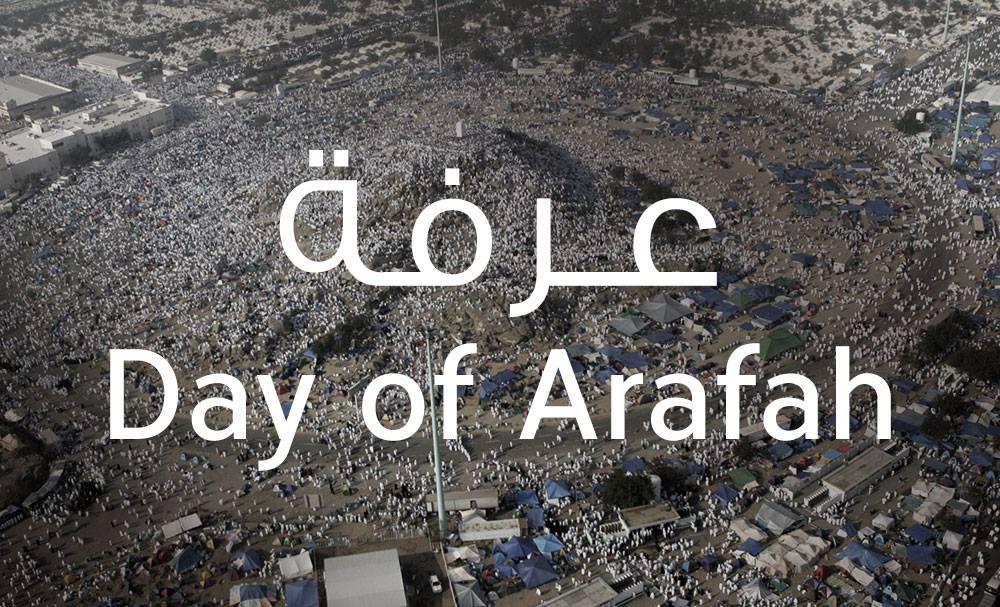
-
The deen (loosely translated as “religion”) of Islam was completed on this day.
الْيَوْمَ أَكْمَلْتُ لَكُمْ دِينَكُمْ وَأَتْمَمْتُ عَلَيْكُمْ نِعْمَتِي وَرَضِيتُ لَكُمُ الْإِسْلَامَ دِينًا
This day, I have perfected your religion for you, completed My Favour upon you, and have chosen for you Islam as your religion. [Surah Al-Maaidah (5) : 3]
So, this day the religion was completed and Allah completed His Favour upon us.
عَنْ طَارِقِ بْنِ شِهَابٍ، قَالَ قَالَ رَجُلٌ مِنَ الْيَهُودِ لِعُمَرَ يَا أَمِيرَ الْمُؤْمِنِينَ لَوْ أَنَّ عَلَيْنَا نَزَلَتْ هَذِهِ الآيَةُ { الْيَوْمَ أَكْمَلْتُ لَكُمْ دِينَكُمْ وَأَتْمَمْتُ عَلَيْكُمْ نِعْمَتِي وَرَضِيتُ لَكُمُ الإِسْلاَمَ دِينًا} لاَتَّخَذْنَا ذَلِكَ الْيَوْمَ عِيدًا. فَقَالَ عُمَرُ إِنِّي لأَعْلَمُ أَىَّ يَوْمٍ نَزَلَتْ هَذِهِ الآيَةُ، نَزَلَتْ يَوْمَ عَرَفَةَ فِي يَوْمِ جُمُعَةٍ
Narrated Tariq bin Shihab (radiallahu anhu): A Jew said to Umar, “O Chief of the Believers, if this verse:
الْيَوْمَ أَكْمَلْتُ لَكُمْ دِينَكُمْ وَأَتْمَمْتُ عَلَيْكُمْ نِعْمَتِي وَرَضِيتُ لَكُمُ الْإِسْلَامَ دِينًا
This day, I have perfected your religion for you, completed My Favour upon you, and have chosen for you Islam as your religion. [Surah Al-Maaidah (5) : 3]
had been revealed upon us, we would have taken that day as an Eid (festival) day.” Umar said, “I know definitely on what day this Verse was revealed; it was revealed on the day of Arafah, on a Friday.” [Sahih Al-Bukhari, Volume 9, Hadeeth No. 373]
The Jews wished that they had gotten this day but we got it. Are we grateful?
2. It is a Day of Eid
Remember the Jew (mentioned above) saying how they would have taken this day as a day of Eid? Well, it IS a day of Eid.
عَنْ عَمَّارِ بْنِ أَبِي عَمَّارٍ، قَالَ قَرَأَ ابْنُ عَبَّاسٍ : ( الْيَوْمَ أَكْمَلْتُ لَكُمْ دِينَكُمْ وَأَتْمَمْتُ عَلَيْكُمْ نِعْمَتِي وَرَضِيتُ لَكُمُ الإِسْلاَمَ دِينًا ) وَعِنْدَهُ يَهُودِيٌّ فَقَالَ لَوْ أُنْزِلَتْ هَذِهِ عَلَيْنَا لاَتَّخَذْنَا يَوْمَهَا عِيدًا . قَالَ ابْنُ عَبَّاسٍ فَإِنَّهَا نَزَلَتْ فِي يَوْمِ عِيدٍ فِي يَوْمِ جُمُعَةٍ وَيَوْمِ عَرَفَةَ
Narrated Ammar bin Abee Ammar: “Ibn Abbas (radiallahu anhuma) recited:
الْيَوْمَ أَكْمَلْتُ لَكُمْ دِينَكُمْ وَأَتْمَمْتُ عَلَيْكُمْ نِعْمَتِي وَرَضِيتُ لَكُمُ الْإِسْلَامَ دِينًا
This day, I have perfected your religion for you, completed My Favour upon you, and have chosen for you Islam as your religion. [Surah Al-Maaidah (5) : 3]
And a Jew was with him who said: ‘If this Ayah (verse) was revealed to us then we would have taken that day as a day of Eid (celebration).’ So Ibn Abbas said: ‘Indeed it was revealed on (two) Eids: On Friday, and on the Day of Arafah.’ [Jaami At-Tirmidhi, Hadeeth 3044. Graded “sahih al-isnad” (authentic chain of narrators) by Al-Albani.]
Yes, both Friday and the Day of Arafah are Eids!
عن عُقْبَة بْنَ عَامِرٍ، قَالَ قَالَ رَسُولُ اللَّهِ صلى الله عليه وسلم : يَوْمُ عَرَفَةَ وَيَوْمُ النَّحْرِ وَأَيَّامُ التَّشْرِيقِ عِيدُنَا أَهْلَ الإِسْلاَمِ وَهِيَ أَيَّامُ أَكْلٍ وَشُرْبٍ
Narrated Uqbah ibn Amir (radiallahu anhu): The Prophet (sallallahu alaihi wasallam) said: The Day of Arafah, the Day of Sacrifice, the Days of Tashreeq are (the days of) our Eid, the people of Islam and they are the days of eating and drinking. [Sunan Abee Dawood, Hadeeth No. 2419. Graded “sahih” (authentic) by Al-Albani.]
عَنِ ابْنِ عَبَّاسٍ، قَالَ قَالَ رَسُولُ اللَّهِ ـ صلى الله عليه وسلم ـ إِنَّ هَذَا يَوْمُ عِيدٍ جَعَلَهُ اللَّهُ لِلْمُسْلِمِينَ فَمَنْ جَاءَ إِلَى الْجُمُعَةِ فَلْيَغْتَسِلْ وَإِنْ كَانَ طِيبٌ فَلْيَمَسَّ مِنْهُ وَعَلَيْكُمْ بِالسِّوَاكِ
It was narrated that Ibn Abbas (radiallahu anhuma) said: “The Messenger of Allah (sallallahu alaihi wasallam) said: ‘This day is an Eid (festival) which Allah has ordained for the Muslims. Whoever comes to Friday (prayer), let him take a bath and if he has perfume then let him put some on. And upon you (I urge to use) is the siwak (tooth stick).” [Sunan Ibn Majah, Hadeeth No. 1098. Graded “hasan” (good) by Al-Albani]
3. Allah swore by it in the Quran
وَالْيَوْمِ الْمَوْعُودِ
وَشَاهِدٍ وَمَشْهُودٍ
And by the Promised Day; And by the witnessing day, and by the witnessed day; [Surah Al-Burooj (85) : 2-3]
What are these three days? Well, the Prophet (sallallahu alaihi wasallam) himself told us what they were.
عَنْ أَبِي هُرَيْرَةَ، قَالَ قَالَ رَسُولُ اللَّهِ صلى الله عليه وسلم : الْيَوْمُ الْمَوْعُودُ يَوْمُ الْقِيَامَةِ وَالْيَوْمُ الْمَشْهُودُ يَوْمُ عَرَفَةَ وَالشَّاهِدُ يَوْمُ الْجُمُعَةِ وَمَا طَلَعَتِ الشَّمْسُ وَلاَ غَرَبَتْ عَلَى يَوْمٍ أَفْضَلَ مِنْهُ فِيهِ سَاعَةٌ لاَ يُوَافِقُهَا عَبْدٌ مُؤْمِنٌ يَدْعُو اللَّهَ بِخَيْرٍ إِلاَّ اسْتَجَابَ اللَّهُ لَهُ وَلاَ يَسْتَعِيذُ مِنْ شَرٍّ إِلاَّ أَعَاذَهُ اللَّهُ مِنْهُ
Abu Hurairah (radiallahu anhu) narrated that the Messenger of Allah (sallallahu alaihi wasallam) said: “Al-Yawmul-Mawud (the Promised Day) is the Day of Resurrection, and Al-Yawmul-Mashhud (the Attended Day) is the Day of Arafah, and Ash-Shahid (the witness) is Friday.” He said: “The sun does not rise nor set, upon a day that is more virtuous than it. In it, there is an hour in which no believing worshipper makes a supplication to Allah for good, except that Allah answers it for him, and he does not seek Allah’s aid for something, except that He aids him in it.” [Jaami At-Tirmidhi, Hadeeth No. 3339. Graded “hasan” (good) by Al-Albani]
So, the witnessing day or the attended day (attended by the pilgrims) is Arafah , and Allah swore by it.
There’s also another place in the Quran where it might have been mentioned.
وَالشَّفْعِ وَالْوَتْرِ
And by the even and the odd (of all the creations of Allah). [Surah Al-Fajr (89) : 3]
Imam Ibn Kathir says in his explanation of this verse*:
“It has been mentioned in a hadeeth that Al-Witr (the odd) is the Day of Arafah because it falls on the ninth, and Ash-Shafi (the even) is the Day of An-Nahr (sacrifice) because it falls on the tenth day. This was also said by Ibn Abbas, Ikrimah and Ad-Dahhak.”
[*I got this from my book (the hardcopy) as it seeming to be missing from the online version. In the footnote, it says that the hadeeth referred to is inauthentic. Allah knows better.]
If this is true, and the odd refers to Arafah, then it has effectively been mentioned TWICE in two consecutive verses. How so? Well, the verse before this one is:
وَلَيَالٍ عَشْرٍ
By the ten nights. [Surah Al-Fajr (89) : 2]
As I mentioned above, this refers to the ten days of Dhul Hijjah which obviously includes the Day of Arafah.
4. Hajj is Arafah
عَنْ عَبْدِ الرَّحْمَنِ بْنِ يَعْمَرَ، قَالَ شَهِدْتُ رَسُولَ اللَّهِ صلى الله عليه وسلم فَأَتَاهُ نَاسٌ فَسَأَلُوهُ عَنِ الْحَجِّ فَقَالَ رَسُولُ اللَّهِ صلى الله عليه وسلم : الْحَجُّ عَرَفَةُ فَمَنْ أَدْرَكَ لَيْلَةَ عَرَفَةَ قَبْلَ طُلُوعِ الْفَجْرِ مِنْ لَيْلَةِ جَمْعٍ فَقَدْ تَمَّ حَجُّهُ
It was narrated that Abdur-Rahman bin Yamur (radiallahu anhu) said: “I saw the Messenger of Allah when people came to him and asked him about Hajj. The Messenger of Allah (sallallahu alaihi wasallam) said: ‘Hajj is Arafah. Whoever catches up with the night of Arafah before dawn comes on the night of Jam (Al-Muzdalifah), his Hajj is complete.'” [Sunan An-Nasai, Hadeeth No. 3019. Graded “sahih” (authentic) by Al-Albani.]
What that basically means is that if you don’t make it to Arafah on time, then you can kiss your Hajj goodbye because standing in Arafah on the 9th of Dhul Hijjah is a pillar of Hajj. If you miss it, you CANNOT make it up.
So, basically a person’s Hajj revolves around this day (and place).
5. There is no day where more people are saved from the Hell Fire
عَن عَائِشَة قَالَتْ إِنَّ رَسُولَ اللَّهِ صلى الله عليه وسلم قَالَ : مَا مِنْ يَوْمٍ أَكْثَرَ مِنْ أَنْ يُعْتِقَ اللَّهُ فِيهِ عَبْدًا مِنَ النَّارِ مِنْ يَوْمِ عَرَفَةَ وَإِنَّهُ لَيَدْنُو ثُمَّ يُبَاهِي بِهِمُ الْمَلاَئِكَةَ فَيَقُولُ مَا أَرَادَ هَؤُلاَءِ
Aishah (radiallahu anhu) reported Allah’s Messenger (sallallahu alaihi wasallam) as saying: There is no day when Allah sets free more servants from Hell than the Day of Arafah. He draws near, then praises them to the angels, saying: What do these want? [Sahih Muslim, Hadeeth No. 3126]
عَنْ ابن عمر أن النبي صلى الله عليه وسلم قال: إنَّ اللهَ عزَّ وجلَّ يُباهي ملائكتَه عشيَّةَ عرفةَ بأهلِ عرفةَ ، فيقول : انظُروا إلى عبادي شُعْثًا غُبْرًا
Ibn Umar (radiallahu anhu) narrated that the Prophet (sallallahu alaihi wasallam) said: “Allah expresses His pride to His angels at the time of Isha on the Day of Arafah, about the people of Arafah. He says, ‘Look at My slaves who have come unkempt and dusty.’” [Sahih At-Targheeb Wat-Tarheeb, Hadeeth No. 1153]
6. Fasting on it expiates the sins of the previous year and the following year
عَنْ أَبِي قَتَادَةَ الأَنْصَارِيِّ، رضى الله عنه أَنَّ رَسُولَ اللَّهِ صلى الله عليه وسلم سُئِلَ عَنْ صَوْمِهِ قَالَ فَغَضِبَ رَسُولُ اللَّهِ صلى الله عليه وسلم فَقَالَ عُمَرُ رضى الله عنه رَضِينَا بِاللَّهِ رَبًّا وَبِالإِسْلاَمِ دِينًا وَبِمُحَمَّدٍ رَسُولاً وَبِبَيْعَتِنَا بَيْعَةً . قَالَ فَسُئِلَ عَنْ صِيَامِ الدَّهْرِ فَقَالَ : لاَ صَامَ وَلاَ أَفْطَرَ . أَوْ : مَا صَامَ وَمَا أَفْطَرَ . قَالَ فَسُئِلَ عَنْ صَوْمِ يَوْمَيْنِ وَإِفْطَارِ يَوْمٍ قَالَ : وَمَنْ يُطِيقُ ذَلِكَ . قَالَ وَسُئِلَ عَنْ صَوْمِ يَوْمٍ وَإِفْطَارِ يَوْمَيْنِ قَالَ : لَيْتَ أَنَّ اللَّهَ قَوَّانَا لِذَلِكَ . قَالَ وَسُئِلَ عَنْ صَوْمِ يَوْمٍ وَإِفْطَارِ يَوْمٍ قَالَ : ذَاكَ صَوْمُ أَخِي دَاوُدَ عَلَيْهِ السَّلاَمُ . قَالَ وَسُئِلَ عَنْ صَوْمِ يَوْمِ الاِثْنَيْنِ قَالَ :ذَاكَ يَوْمٌ وُلِدْتُ فِيهِ وَيَوْمٌ بُعِثْتُ أَوْ أُنْزِلَ عَلَىَّ فِيهِ . قَالَ فَقَالَ : صَوْمُ ثَلاَثَةٍ مِنْ كُلِّ شَهْرٍ وَرَمَضَانَ إِلَى رَمَضَانَ صَوْمُ الدَّهْرِ . قَالَ وَسُئِلَ عَنْ صَوْمِ يَوْمِ عَرَفَةَ فَقَالَ : يُكَفِّرُ السَّنَةَ الْمَاضِيَةَ وَالْبَاقِيَةَ . قَالَ وَسُئِلَ عَنْ صَوْمِ يَوْمِ عَاشُورَاءَ فَقَالَ : يُكَفِّرُ السَّنَةَ الْمَاضِيَةَ
Abu Qatada al-Ansari (radiallahu anhu) reported that the Messenger of Allah (sallallahu alaihi wasallam) was asked about his fasting. The Messenger of Allah (sallallahu alaihi wasallam) felt annoyed. Thereupon Umar (radiallahu anhu) said: We are pleased with Allah as the Lord, with Islam as our Code of Life, with Muhammad as the Messenger and with our pledge (to you for willing and cheerful submission) as a (sacred) commitment. He was then asked about perpetual fasting, whereupon he said: He neither fasted nor did he break it, or he did not fast and he did not break it. He was then asked about fasting for two days and breaking one day. He (the Prophet) said: And who has strength enough to do it? He was asked about fasting for a day and breaking for two days, whereupon he said: May Allah bestow upon us strength to do it. He was then asked about fasting for a day and breaking on the other, whereupon he said: That is the fasting of my brother Dawood (alaihissalam). He was then asked about fasting on Monday, whereupon he said: It was the day on which I was born. on which I was commissioned with prophethood or revelation was sent to me, (and he further) said: Three days’ fasting every month and of the whole of Ramadan every year is a perpetual fast. He was asked about fasting on the day of Arafah (9th of Dhul Hijjah), whereupon he said: It expiates the sins of the preceding year and the coming year. He was asked about fasting on the day of Ashurah (10th of Muharram), whereupon be said: It expiates the sins of the preceding year. [Sahih Muslim, Hadeeth No. 2603]
Note: It’s better for the Hajj pilgrim not to fast on the Day of Arafah (the 9th of Dhul Hijjah) as the Prophet (sallallahu alaihi wasallam) did not fast then.
عَنِ ابْنِ أَبِي نَجِيحٍ، عَنْ أَبِيهِ، قَالَ سُئِلَ ابْنُ عُمَرَ عَنْ صَوْمِ، يَوْمِ عَرَفَةَ بِعَرَفَةَ فَقَالَ حَجَجْتُ مَعَ النَّبِيِّ صلى الله عليه وسلم فَلَمْ يَصُمْهُ وَمَعَ أَبِي بَكْرٍ فَلَمْ يَصُمْهُ وَمَعَ عُمَرَ فَلَمْ يَصُمْهُ وَمَعَ عُثْمَانَ فَلَمْ يَصُمْهُ . وَأَنَا لاَ أَصُومُهُ وَلاَ آمُرُ بِهِ وَلاَ أَنْهَى عَنْهُ
Ibn Abi Najib narrated from his father who said:”Ibn Umar was asked about fasting (the Day of) Arafah (at Arafah). He said: ‘I performed Hajj with the Prophet, and he did not fast it, and with Abu Bakr, and he did not fast it, and with Umar, and he did not fast it, and with Uthman, and he did not fast it. I do not fast it, nor order it nor forbid it.” [Jaami At-Tirmidhi, Hadeeth No. 751. Graded “sahih al-isnad” (authentic chain of narrators) by Al-Albani.]
7. The best of duas (supplication) is dua on the Day of Arafah
عَنْ عَمْرِو بْنِ شُعَيْبٍ، عَنْ أَبِيهِ، عَنْ جَدِّهِ، أَنَّ النَّبِيَّ صلى الله عليه وسلم قَالَ : خَيْرُ الدُّعَاءِ دُعَاءُ يَوْمِ عَرَفَةَ وَخَيْرُ مَا قُلْتُ أَنَا وَالنَّبِيُّونَ مِنْ قَبْلِي لاَ إِلَهَ إِلاَّ اللَّهُ وَحْدَهُ لاَ شَرِيكَ لَهُ لَهُ الْمُلْكُ وَلَهُ الْحَمْدُ وَهُوَ عَلَى كُلِّ شَيْءٍ قَدِيرٌ
Amr ibn Shuaib narrated from his father, from his grandfather, that the Prophet (sallallahu alaihi wasallam) said: “The best of supplication is the supplication of the Day of Arafah. And the best of what I and the Prophets before me have said is: None has the right to be worshipped but Allah, Alone, without partner, to Him belongs all that exists, and to Him belongs the Praise, and He is powerful over all things. (Lā ilāha illallāh, waḥdahu lā sharīka lahu, lahul-mulku wa lahul-ḥamdu, wa huwa `alā kulli shai’in qadīr).’” [Jaami At-Tirmidhi, Hadeeth No. 3585. Graded “hasan” (good) by Al-Albani.]
So, we need to make sure that we do a LOT of dua on this day and also recite this particular dua (mentioned above) as much as we can on this day.
An interesting point to note: Both Laylatul Qadr and the Day of Arafah have a specific dua that is recited in them. As far as I can recall, no other day or night has a specific dua for it.

COMPARING THE DEEDS WITHIN THE TWO SETS
I use the term “comparing” very loosely because comparing the last ten nights of Ramadan and the first ten days of Dhul Hijjah is a bit like comparing apples and oranges (hence the picture).
So, what deeds do they have in common and what are their differences? In this section, I’ll go through each deed. At the end, I’ll summarise the deeds in each.
Please note that this is for those who are NOT going for Hajj as those who are on Hajj have specific rituals that they need to follow.
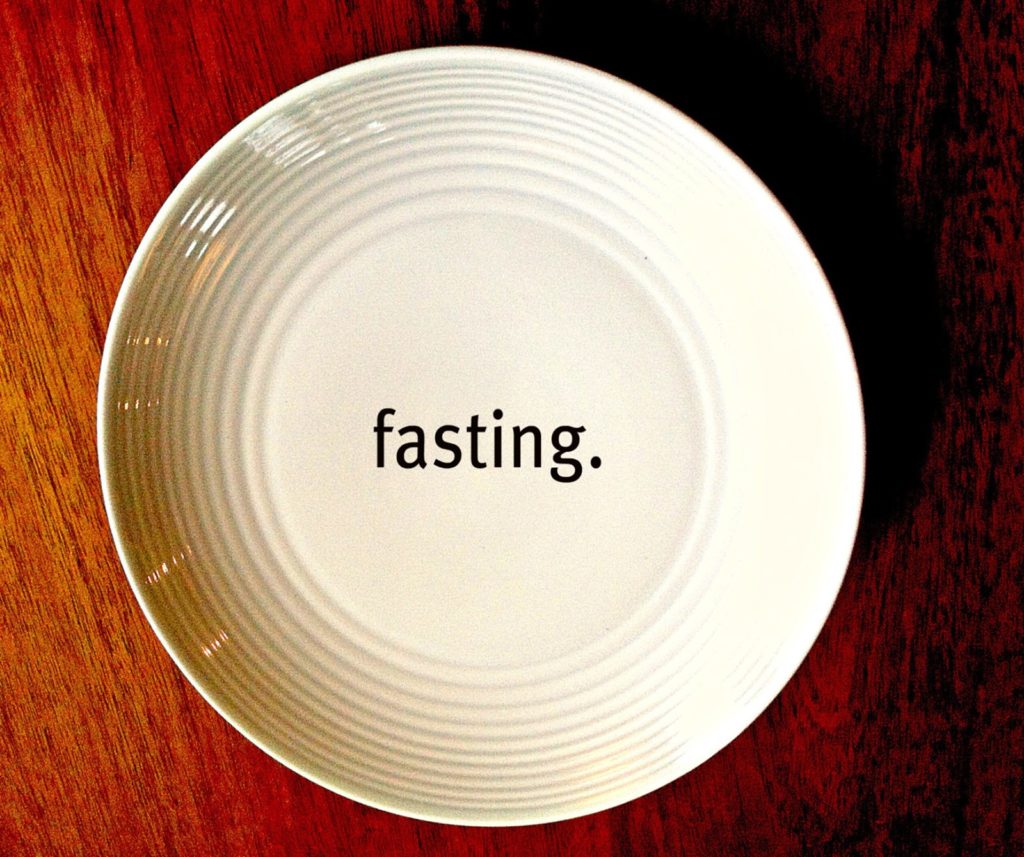
Fasting in Ramadan is a pillar of Islam and therefore is obligatory. Whoever misses a fast is required to make it up later.
فَمَن شَهِدَ مِنكُمُ الشَّهْرَ فَلْيَصُمْهُ ۖ وَمَن كَانَ مَرِيضًا أَوْ عَلَىٰ سَفَرٍ فَعِدَّةٌ مِّنْ أَيَّامٍ أُخَرَ
So whoever of you sights (the crescent on the first night of) the month (of Ramadan i.e. is present at his home), he must observe Saum (fasts) that month, and whoever is ill or on a journey, the same number [of days which one did not observe Saum (fasts) must be made up] from other days. [Surah Al-Baqarah (2) : 185]
Fasting the first 9 days of Dhul Hijjah is recommended, NOT obligatory.
عَنْ هُنَيْدَةَ بْنِ خَالِدٍ، عَنِ امْرَأَتِهِ، عَنْ بَعْضِ، أَزْوَاجِ النَّبِيِّ صلى الله عليه وسلم أَنَّ رَسُولَ اللَّهِ صلى الله عليه وسلم كَانَ يَصُومُ تِسْعًا مِنْ ذِي الْحِجَّةِ وَيَوْمَ عَاشُورَاءَ وَثَلاَثَةَ أَيَّامٍ مِنْ كُلِّ شَهْرٍ أَوَّلَ اثْنَيْنِ مِنَ الشَّهْرِ وَخَمِيسَيْنِ
It was narrated from Hunaidah bin Khalid, from his wife, from one of the wives of the Prophet, that the Messenger of Allah (sallallahu alaihi wasallam) used to fast nine days of Dhul-Hijjah, the day of Ashura, and three days of each month: The first Monday of the month, and two Thursday. [Sunan An-Nasai, Hadeeth No. 2419. Graded “sahih” by Al-Albani.]
As mentioned earlier, fasting on the 9th of Dhul Hijjah i.e. the Day of Arafah, expiates the sins of the preceding year and the coming year. So if you cannot do the full nine days, at least make sure that you fast on the Day of Arafah and encourage everyone around you to do so.
Fasting on the 10th Day i.e. the Day of Eid, is prohibited.
عَنْ عَائِشَةَ، – رضى الله عنها – قَالَتْ نَهَى رَسُولُ اللَّهِ صلى الله عليه وسلم عَنْ صَوْمَيْنِ يَوْمِ الْفِطْرِ وَيَوْمِ الأَضْحَى
Aishah (radiallahu anha) said that the Prophet (sallallahu alaihi wasallam) forbade to observe fast on two days-the day of Fitr and the day of Adha. [Sahih Muslim, Hadeeth No. 2538]
Fasting on the Days of Tashreeq (i.e. the 11th, 12th and 13th of Dhul Hijjah) is also prohibited.
عن حمزة بن عمرو الأسلمي و بديل بن ورقاء :عَنِ النَّبِيِّ صلى الله عليه وسلم أَنَّهُ قَال: لا تصوموا هذه الأيامَ أيامَ التشريقِ ، فإنها أيامُ أَكْلٍ وشُرْبٍ
Hamza ibn Amr Al-Aslami and Badeel ibn Warqaa (radiallahu anhuma) narrated that the Prophet (sallallahu alaihi wasallam): “Do not fast on these days, the Days of Tashreeq, for they are the days of eating and drinking.” [Sahih Al-Jaami, Hadeeth No. 7355]
The only exception is those who are doing Hajj At-Tamattu or Al-Qiran and did not get a hadi (sacrificial animal). This group may fast on these three days.
عَنِ ابْنِ عُمَرَ ـ رضى الله عنهما ـ قَالَ الصِّيَامُ لِمَنْ تَمَتَّعَ بِالْعُمْرَةِ إِلَى الْحَجِّ، إِلَى يَوْمِ عَرَفَةَ، فَإِنْ لَمْ يَجِدْ هَدْيًا وَلَمْ يَصُمْ صَامَ أَيَّامَ مِنًى
Narrated Ibn Umar (radiallahu anhuma): Fasting for those who perform Hajj-at-Tamattu (in lieu of the Hadi which they cannot afford) may be performed up to the day of Arafah. And if one does not get a Hadi and has not fasted (before the Eid) then one should fast of the days of Mina. (11, 12 and 13th of Dhul Hijjah). [Sahih Al-Bukhari, Volume 3, Hadeeth No. 217]
Please refer to this article for more details.
Note: Fasting the 13th, 14th and 15th of any month is generally recommended.
عَنْ أَبَي ذَرٍّ، يَقُولُ قَالَ رَسُولُ اللَّهِ صلى الله عليه وسلم : يَا أَبَا ذَرٍّ إِذَا صُمْتَ مِنَ الشَّهْرِ ثَلاَثَةَ أَيَّامٍ فَصُمْ ثَلاَثَ عَشْرَةَ وَأَرْبَعَ عَشْرَةَ وَخَمْسَ عَشْرَةَ
Abu Dharr (radiallahu anhu) narrated that the Messenger of Allah (sallallahu alaihi wasallam) said: “O Abu Dharr! When you fast three days out of a month, then fast the thirteenth, fourteenth, and fifteenth.” [Jaami At-Tirmidhi, Hadeeth No. 761. Graded “hasan sahih” (authentic) by Al-Albani.]
However, fasting the 13th, 14th and 15th of Ramadan is obligatory, whereas fasting the 13th of Dhul Hijjah is prohibited except for one case (mentioned above).
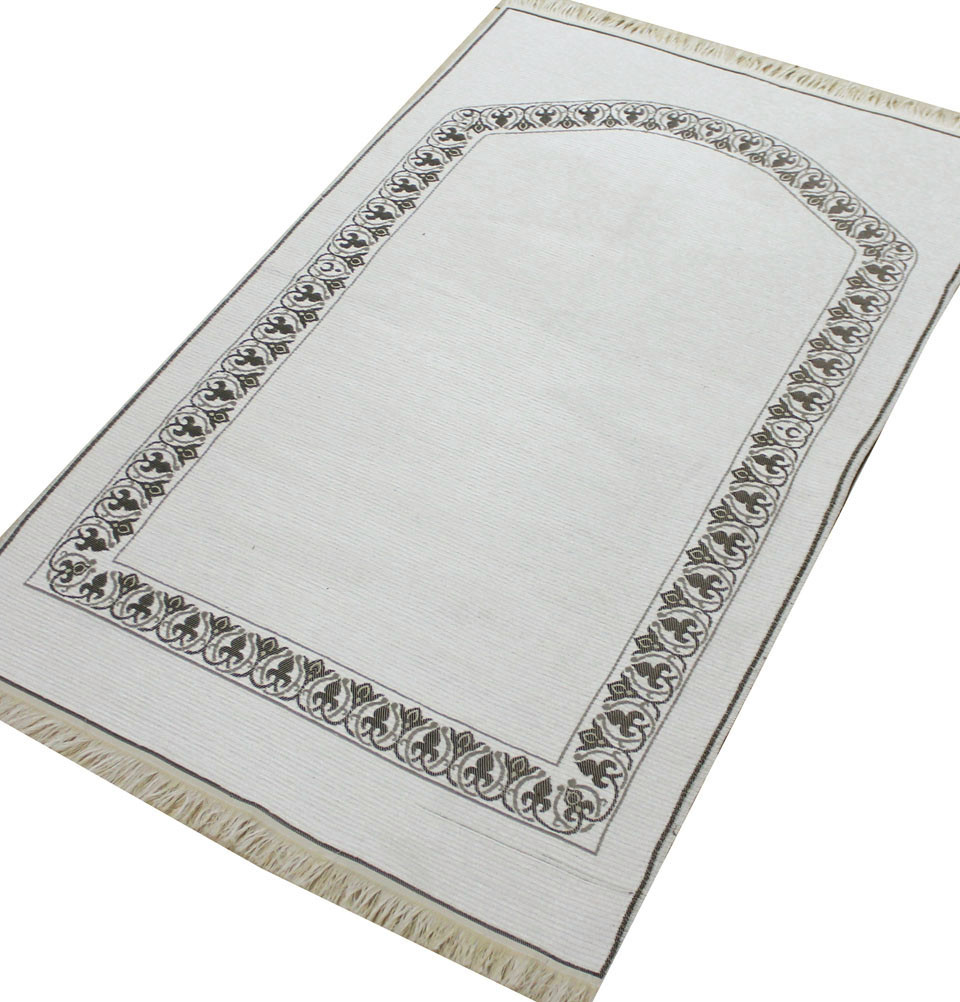
Ramadan has special prayers i.e. Taraweeh and Qiyam Al-Layl (especially in the last ten nights).
عَنْ أَبِي ذَرٍّ، قَالَ صُمْنَا مَعَ رَسُولِ اللَّهِ ـ صلى الله عليه وسلم ـ رَمَضَانَ فَلَمْ يَقُمْ بِنَا شَيْئًا مِنْهُ حَتَّى بَقِيَ سَبْعُ لَيَالٍ فَقَامَ بِنَا لَيْلَةَ السَّابِعَةِ حَتَّى مَضَى نَحْوٌ مِنْ ثُلُثِ اللَّيْلِ ثُمَّ كَانَتِ اللَّيْلَةُ السَّادِسَةُ الَّتِي تَلِيهَا فَلَمْ يَقُمْهَا حَتَّى كَانَتِ الْخَامِسَةُ الَّتِي تَلِيهَا ثُمَّ قَامَ بِنَا حَتَّى مَضَى نَحْوٌ مِنْ شَطْرِ اللَّيْلِ فَقُلْتُ يَا رَسُولَ اللَّهِ لَوْ نَفَّلْتَنَا بَقِيَّةَ لَيْلَتِنَا هَذِهِ . فَقَالَ : إِنَّهُ مَنْ قَامَ مَعَ الإِمَامِ حَتَّى يَنْصَرِفَ فَإِنَّهُ يَعْدِلُ قِيَامَ لَيْلَةٍ . ثُمَّ كَانَتِ الرَّابِعَةُ الَّتِي تَلِيهَا فَلَمْ يَقُمْهَا حَتَّى كَانَتِ الثَّالِثَةُ الَّتِي تَلِيهَا . قَالَ فَجَمَعَ نِسَاءَهُ وَأَهْلَهُ وَاجْتَمَعَ النَّاسُ . قَالَ فَقَامَ بِنَا حَتَّى خَشِينَا أَنْ يَفُوتَنَا الْفَلاَحُ . قِيلَ وَمَا الْفَلاَحُ قَالَ السُّحُورُ . قَالَ ثُمَّ لَمْ يَقُمْ بِنَا شَيْئًا مِنْ بَقِيَّةِ الشَّهْرِ
It was narrated that Abu Dharr (radiallahu anhu) said: “We fasted Ramadan with the Messenger of Allah (sallallahu alaihi wasallam) and he did not lead us in praying qiyam (prayers at night) during any part of it, until there were seven nights left. He led us in praying qiyam on the seventh night until approximately one third of the night had passed. Then on the sixth night which followed it he did not lead us in prayer. Then he led us in praying qiyam on the fifth night which followed it until almost half the night had passed. I said: ‘O Messenger of Allah, would that we had offered voluntary prayers throughout the whole night.’ He said: ‘Whoever stands with the Imam until he finishes, it is equivalent to spending the whole night in prayer.’ Then on the fourth night which followed it, he did not lead us in prayer, until the third night that followed it, when he gathered his wives and family, and the people gathered, and he led us in prayer until we feared that we would miss the Falah.” It was asked: “What is the Falah?” He said: “Suhur.” He said: “Then he did not lead us in prayer at night for the rest of the month.” [Sunan Ibn Majah, Hadeeth No. 1327. Graded “sahih” (authentic) by Al-Albani.]
عَنْ أَبِي هُرَيْرَةَ، أَنَّ رَسُولَ اللَّهِ صلى الله عليه وسلم قَالَ: مَنْ قَامَ رَمَضَانَ إِيمَانًا وَاحْتِسَابًا غُفِرَ لَهُ مَا تَقَدَّمَ مِنْ ذَنْبِهِ
Narrated Abu Hurairah (radiallahu anhu): Allah’s Messenger (sallallahu alaihi wasallam) said: “Whoever establishes prayers during the nights of Ramadan faithfully out of sincere faith and hoping to attain Allah’s rewards (not for showing off), all his past sins will be forgiven.” [Sahih Al-Bukhari, Volume 1, Hadeeth No. 36]
عَنْ أَبِي هُرَيْرَةَ ـ رضى الله عنه ـ عَنِ النَّبِيِّ صلى الله عليه وسلم قَالَ : مَنْ قَامَ لَيْلَةَ الْقَدْرِ إِيمَانًا وَاحْتِسَابًا غُفِرَ لَهُ مَا تَقَدَّمَ مِنْ ذَنْبِهِ، وَمَنْ صَامَ رَمَضَانَ إِيمَانًا وَاحْتِسَابًا غُفِرَ لَهُ مَا تَقَدَّمَ مِنْ ذَنْبِهِ
Narrated Abu Hurairah (radiallahu anhu): The Prophet (sallallahu alaihi wasallam) said, “Whoever established prayers on Laylatul Qadr out of sincere faith and hoping for a reward from Allah, then all his previous sins will be forgiven; and whoever fasts in the month of Ramadan out of sincere faith, and hoping for a reward from Allah, then all his previous sins will be forgiven.” [Sahih Al-Bukhari, Volume 3, Hadeeth No. 125]
What about the first ten days of Dhul Hijjah? Well, it’s also good to stand up in prayer during their nights (but remember that Taraweeh is specific to Ramadan).
Also, the Eid prayer is held on the 10th i.e. within these days, and everyone should attend it.
عَنْ أُمِّ عَطِيَّةَ، قَالَتْ أَمَرَنَا رَسُولُ اللَّهِ صلى الله عليه وسلم أَنْ نُخْرِجَهُنَّ فِي الْفِطْرِ وَالأَضْحَى الْعَوَاتِقَ وَالْحُيَّضَ وَذَوَاتِ الْخُدُورِ فَأَمَّا الْحُيَّضُ فَيَعْتَزِلْنَ الصَّلاَةَ وَيَشْهَدْنَ الْخَيْرَ وَدَعْوَةَ الْمُسْلِمِينَ . قُلْتُ يَا رَسُولَ اللَّهِ إِحْدَانَا لاَ يَكُونُ لَهَا جِلْبَابٌ قَالَ : لِتُلْبِسْهَا أُخْتُهَا مِنْ جِلْبَابِهَا
Umm Atiyyah (radiallahu anha) reported: The Messenger of Allah (sallallahu alaihi wasallam) commanded us to bring out on Eid Al-Fitr and Eid Al-Adha, young women, menstruating women and ladies in seclusion. The menstruating women kept back from prayer, but participated in goodness and supplication of the Muslims. I said: Messenger of Allah, one of us does not have an outer garment (to cover her face and body). He said: Let her sister cover her with her outer garment. [Sahih Muslim, Hadeeth No. 1934]
So, the menstruating women should go and at least listen to the Eid khutbah (the sermon).
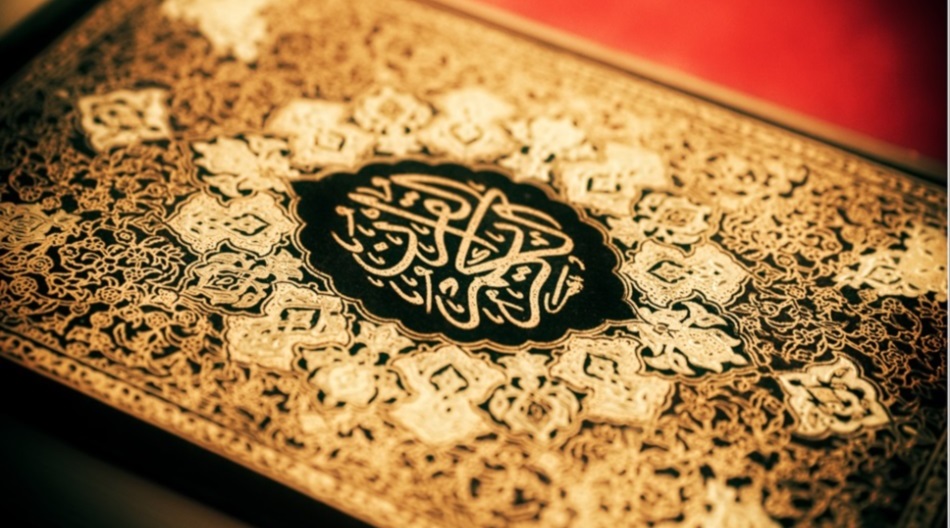
Ramadan of course is the month of the Quran as the Quran was revealed during it. So, the Quran should be a focus in the last ten nights as well.
عَنِ ابْنِ عَبَّاسٍ، قَالَ كَانَ رَسُولُ اللَّهِ صلى الله عليه وسلم أَجْوَدَ النَّاسِ، وَكَانَ أَجْوَدُ مَا يَكُونُ فِي رَمَضَانَ حِينَ يَلْقَاهُ جِبْرِيلُ، وَكَانَ يَلْقَاهُ فِي كُلِّ لَيْلَةٍ مِنْ رَمَضَانَ فَيُدَارِسُهُ الْقُرْآنَ، فَلَرَسُولُ اللَّهِ صلى الله عليه وسلم أَجْوَدُ بِالْخَيْرِ مِنَ الرِّيحِ الْمُرْسَلَةِ
Narrated Ibn Abbas (radiallahu anhu): “Allah’s Messenger (sallallahu alaihi wasallam) was the most generous of all the people, and he used to reach the peak in generosity in the month of Ramadan when Jibreel met him. Jibreel used to meet him every night of Ramadan to teach him the Quran. Allah’s Messenger (sallallahu alaihi wasallam) was the most generous person, even more generous than the strong uncontrollable wind (in readiness and haste to do charitable deeds).” [Sahih Al-Bukhari, Volume 1, Hadeeth No. 5]
As the Quran is the best remembrance, one should also recite a lot of it in the first ten days of Dhul Hijjah.
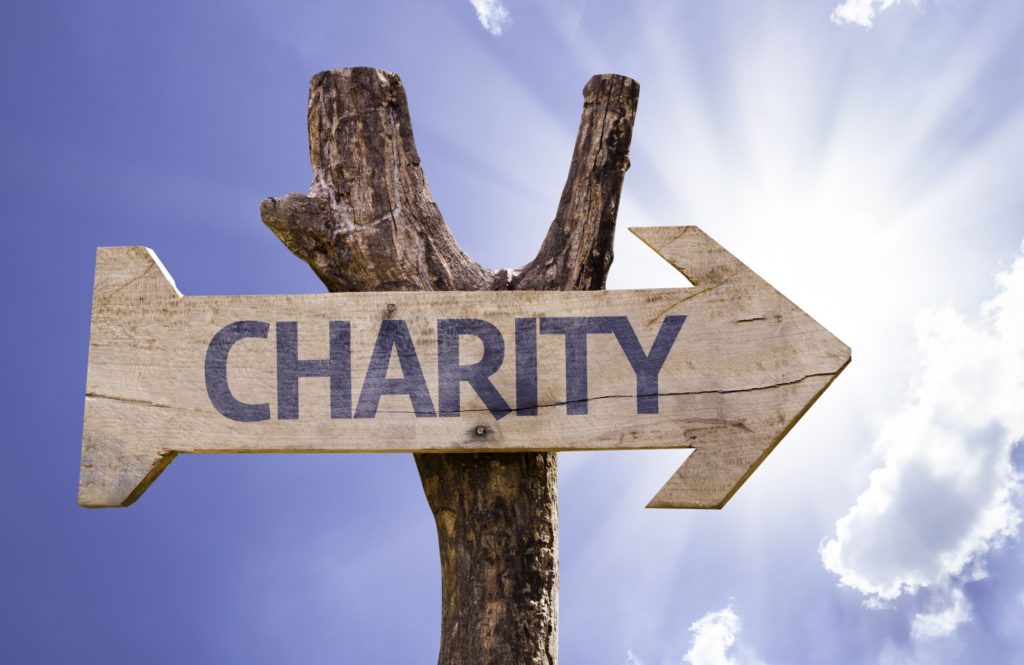
Ramadan, especially the last ten days, is a great time to be generous.
عَنِ ابْنِ عَبَّاسٍ، قَالَ كَانَ رَسُولُ اللَّهِ صلى الله عليه وسلم أَجْوَدَ النَّاسِ، وَكَانَ أَجْوَدُ مَا يَكُونُ فِي رَمَضَانَ حِينَ يَلْقَاهُ جِبْرِيلُ، وَكَانَ يَلْقَاهُ فِي كُلِّ لَيْلَةٍ مِنْ رَمَضَانَ فَيُدَارِسُهُ الْقُرْآنَ، فَلَرَسُولُ اللَّهِ صلى الله عليه وسلم أَجْوَدُ بِالْخَيْرِ مِنَ الرِّيحِ الْمُرْسَلَةِ
Narrated Ibn Abbas (radiallahu anhu): “Allah’s Messenger (sallallahu alaihi wasallam) was the most generous of all the people, and he used to reach the peak in generosity in the month of Ramadan when Jibreel met him. Jibreel used to meet him every night of Ramadan to teach him the Quran. Allah’s Messenger (sallallahu alaihi wasallam) was the most generous person, even more generous than the strong uncontrollable wind (in readiness and haste to do charitable deeds).” [Sahih Al-Bukhari, Volume 1, Hadeeth No. 5]
As the first ten days of Dhul Hijjah have so many virtues, obviously it is a good time to give charity. Time to cough it up.
What about zakaah? Well, that depends on each person, not on a specific time of year.
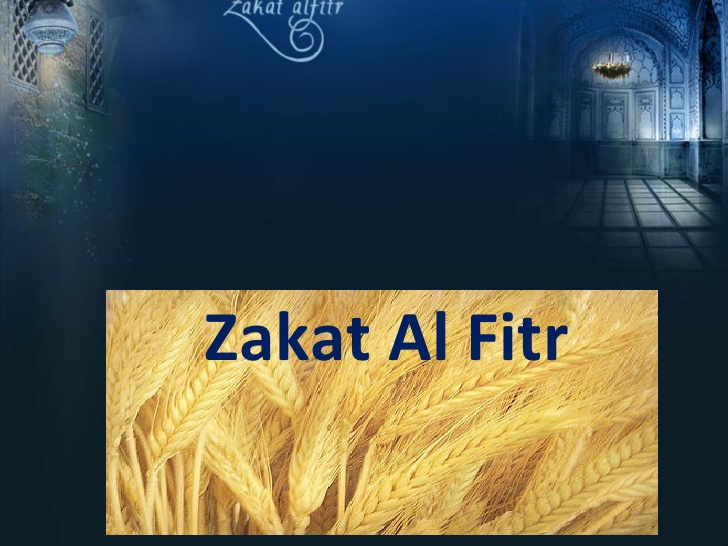
Zakatul fitr is due before the Eid Al-Fitr prayer. It can only be done one or two deeds before it.
عَنِ ابْنِ عُمَرَ ـ رضى الله عنهما ـ قَالَ فَرَضَ رَسُولُ اللَّهِ صلى الله عليه وسلم زَكَاةَ الْفِطْرِ صَاعًا مِنْ تَمْرٍ، أَوْ صَاعًا مِنْ شَعِيرٍ عَلَى الْعَبْدِ وَالْحُرِّ، وَالذَّكَرِ وَالأُنْثَى، وَالصَّغِيرِ وَالْكَبِيرِ مِنَ الْمُسْلِمِينَ، وَأَمَرَ بِهَا أَنْ تُؤَدَّى قَبْلَ خُرُوجِ النَّاسِ إِلَى الصَّلاَةِ
Narrated Ibn Umar (radiallahu anhuma): Allah’s Messenger (sallallahu alaihi wasallam) enjoined the payment of one saa of dates or one saa of barley as zakat-ul-fitr on every Muslim slave or free, male or female, young or old, and he ordered that it be paid before the people went out to offer the Eid prayer. (One saa=3 Kilograms approx.) [Sahih Al-Bukhari, Volume 2, Hadeeth No. 579]
There’s no zakatul fitr in Dhul Hijjah.
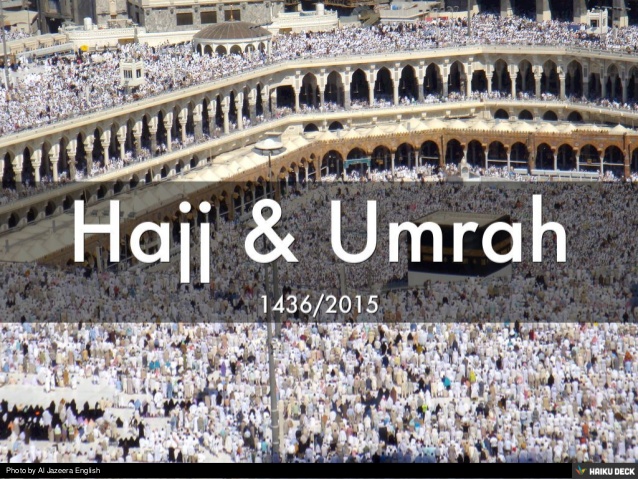
Well, the days of Hajj only fall in Dhul Hijjah. Umrah done for Hajj Tamattu or Qiran (two of the three types of Hajj) can only be done in Shawwal, Dhul Qaadah or the beginning of Dhul Hijjah.
There is no Hajj in Ramadan obviously but Umrah in this month (not just the last ten nights) has the reward of Hajj and is like Hajj with the Prophet (sallallahu alaihi wasallam).
عن عطاءٍ قال سمعتُ ابنَ عبَّاسٍ رضيَ اللّهُ عنهما يُخبرنا يقول :قال رسولُ اللّهِ صلى الله عليه وسلّم لامرأةٍ منَ الأنصارِ ـ سمَّاها ابن عبَّاسٍ فنسيتُ اسمها ـ ما مَنَعَكِ أن تَحُجِّي معنا؟ قالت كان لنا ناضحٌ، فركبهُ أبو فلانٍ وابنه ـ لزوجِها وابنِها ـ وتركَ ناضحاً نَنضحُ عليه. قال: فإذا كان رمضانُ اعتمري فيه، فان عُمرةً في رمضان حَجةٌ. أو نحواً مما قال
Narrated Ataa: I heard Ibn Abbas (radiallahu anhuma) saying, “The Messenger of Allah (sallallahu alaihi wasallam) asked an Ansari woman (Ibn Abbas named her but Ata forgot her name), ‘What prevented you from performing Hajj with us?’ She replied, ‘We have a camel and the father of so-and-so and his son (i.e. her husband and her son) rode it and left one camel for us to use for irrigation.’ He said (to her), ‘Perform Umrah when Ramadan comes, for Umrah in Ramadan is equal to Hajj (in reward),’ or said something similar.” [Sahih Bukhari, Volume No. 3, Hadeeth No. 10]
عن ابن عَبَّاسٍ ، قالَ: أَرَادَ رَسُولُ الله صلى الله عليه وسلّم الْحَجَّ فَقَالَتْ امْرَأَةٌ لِزَوْجِهَا أَحِجَّنِي مَع رَسُولِ الله صلى الله عليه وسلّم عَلَى جَمَلِكَ فَقالَ مَا عِنْدِي مَا أُحِجُّكِ عَلَيْهِ قالَتْ أحْجِجْنِي عَلَى جَمَلِكِ فُلاَنٍ قالَ ذَاكَ حَبِيسٌ في سَبِيلِ الله عَزَّوَجَلَّ فأَتَى رَسُولَ الله صلى الله عليه وسلّم فَقَالَ إنَّ امْرَأَتِي تَقْرَأُ عَلَيْكَ السَّلاَمَ وَرَحْمَةَ الله وَإِنَّها سَأَلَتْنِي الْحَجَّ مَعَكَ قالَتْ أَحِجَّنِي مع رَسُولِ الله صلى الله عليه وسلّم، فَقُلْتُ مَا عِنْدِي مَا أُحِجُّكِ عَلَيْهِ قالَتْ أَحِجَّنِي عَلَى جَمَلِكَ فُلاَنٍ، فَقُلْتُ ذَاكَ حَبِيسٌ في سَبِيلِ الله عَزَّوَجَلَّ قالَ أَمَا إِنَّكَ لَوْ أَحْجَجْتَها عَلَيْهِ كَانَ فِي سِبيلِ الله، أَمَا وَإِنَّهَا أمَرَتْنِي أَنْ أَسأَلَكَ مَا يَعْدِلُ حِجَّةً مَعَكَ؟ قال رَسُولِ الله صلى الله عليه وسلّم أقْرِئْهَا السَّلاَمَ وَرحمَةَ الله وَبَرَكَاتِهِ وَاخْبِرْها أَنَّهَا تَعْدِلُ حَجَّةً معِي يَعْنِي عُمْرَةً في رَمَضَانَ
Narrated Ibn Abbas (radiallahu anhuma): The Messenger of Allah (sallallahu alaihi wasallam) intended to perform Hajj. A woman said to her husband: Let me perform Hajj along with the Messenger of Allah (sallallahu alaihi wasallam)). He said: I have nothing on which I can let you perform Hajj. She said: You may perform Hajj on your such-and-such camel. He said: That is dedicated to the cause of Allah, the Exalted. He then came to the Messsenger of Allah (sallallahu alaihi wasallam) and said: My wife has conveyed her greetings and the blessings of Allah to you. She has asked about performing Hajj along with you. She said (to me): Let me perform Hajj with the Messenger of Allah (sallallahu alaihi wasallam). I said (to her): I have nothing upon which I can let you perform Hajj. She said: Let me perform Hajj on your such-and-such camel. I said: That is dedicated to the cause of Allah, the Exalted. He replied: If you let her perform Hajj on it, that would be in the cause of Allah. He said: She has also requested me to ask you: What is that action which is equivalent to performing Hajj with you? The Messenger of Allah (sallallahu alaihi wasallam) said: Convey my greetings, the mercy of Allah and His blessings to her and tell her that Umrah during Ramadan is equivalent to performing Hajj along with me.” [Sunan Abee Dawood, Hadeeth No. 1990. Graded “hasan sahih” (authentic) by Al-Albani.]
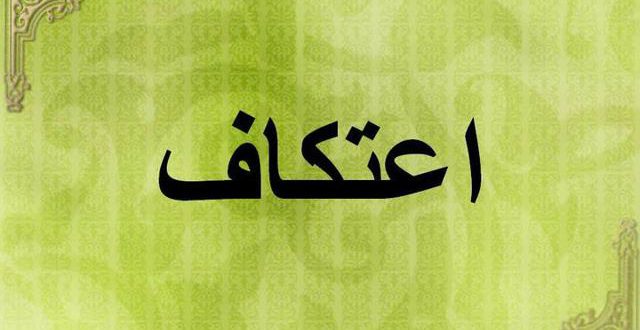
The Prophet (sallallahu alaihi wasallam) did itikaf (staying in the masjid) the last ten days of Ramadan.
عَنْ عَائِشَةَ ـ رضى الله عنها ـ زَوْجِ النَّبِيِّ صلى الله عليه وسلم أَنَّ النَّبِيَّ صلى الله عليه وسلم كَانَ يَعْتَكِفُ الْعَشْرَ الأَوَاخِرَ مِنْ رَمَضَانَ حَتَّى تَوَفَّاهُ اللَّهُ، ثُمَّ اعْتَكَفَ أَزْوَاجُهُ مِنْ بَعْدِهِ
Narrated Aishah (radiallahu anha): “The Prophet (salallahu alaihi wasallam) used to practice itikaaf in the last ten days of Ramadan until he died and then his wives used to practice Itikaf after him.” [Sahih Al-Bukhari, Volume No. 3, Hadeeth No. 243]
What about Dhul Hijjah? Well, itikaf is recommended at any time of year! Obviously, the last ten days of Ramadan are the best times to do itikaf but it can be done at anytime. Here’s an article discussing this issue.

There is no slaughtering in Ramadan. The slaughtering in Dhul Hijjah starts from after the Eid prayer and can be done until the end of the 13th (i.e. Maghrib). You can read more about its ruling here.
There are some rules to be followed for those who want to do it. Please refer to this article for more information.

Ramadan, especially the last ten nights is a great time for dua (supplication).
عَنْ أبي سعيد الخدري رضي الله عنه قال : قال رسول الله صلى الله عليه وسلم إنَّ للهِ تبارك و تعالى عُتقاءَ في كلِّ يومٍ و ليلةٍ ( يعني في رمضانَ ) . و إنَّ لكلِّ مسلمٍ في كلِّ يومٍ وليلةٍ دعوةٌ مُستجابةٌ
Abu Saeed said (radiallahu anhu): The Messenger of Allah (sallallahu alaihi wasallam) said: “Allah has people whom He redeems every day and night – meaning in Ramadaan – and every Muslim every day and night has a supplication that is answered.” [Sahih At-Targheeb wat-Tarheeb, Hadeeth No. 1002]
As mentioned above, there is a specific dua which is the best one to say in the last ten nights.
عَنْ عَائِشَةَ، أَنَّهَا قَالَتْ يَا رَسُولَ اللَّهِ أَرَأَيْتَ إِنْ وَافَقْتُ لَيْلَةَ الْقَدْرِ مَا أَدْعُو قَالَ :تَقُولِينَ اللَّهُمَّ إِنَّكَ عَفُوٌّ تُحِبُّ الْعَفْوَ فَاعْفُ عَنِّي
It was narrated from Aishah (radiallahu anhu) that she said: “O Messenger of Allah, what do you think I should say in my supplication, if I come upon Laylatul-Qadr?” He (sallallahu alaihi wasallam) said: “Say: ‘Allahumma innaka afuwwun tuhibbul-afwa, fafu anni (O Allah, You are Forgiving and love forgiveness, so forgive me).’” [Sunan Ibn Majah, Hadeeth No. 3850. Graded “sahih” (authentic) by Al-Albani.]
Dua on the Day of Arafah is the best of duas. There is also a specific dua to be done on that day.
عَنْ عَمْرِو بْنِ شُعَيْبٍ، عَنْ أَبِيهِ، عَنْ جَدِّهِ، أَنَّ النَّبِيَّ صلى الله عليه وسلم قَالَ : خَيْرُ الدُّعَاءِ دُعَاءُ يَوْمِ عَرَفَةَ وَخَيْرُ مَا قُلْتُ أَنَا وَالنَّبِيُّونَ مِنْ قَبْلِي لاَ إِلَهَ إِلاَّ اللَّهُ وَحْدَهُ لاَ شَرِيكَ لَهُ لَهُ الْمُلْكُ وَلَهُ الْحَمْدُ وَهُوَ عَلَى كُلِّ شَيْءٍ قَدِيرٌ
Amr ibn Shuaib narrated from his father, from his grandfather, that the Prophet (sallallahu alaihi wasallam) said: “The best of supplication is the supplication of the Day of Arafah. And the best of what I and the Prophets before me have said is: None has the right to be worshipped but Allah, Alone, without partner, to Him belongs all that exists, and to Him belongs the Praise, and He is powerful over all things. (Lā ilāha illallāh, waḥdahu lā sharīka lahu, lahul-mulku wa lahul-ḥamdu, wa huwa `alā kulli shai’in qadīr).’” [Jaami At-Tirmidhi, Hadeeth No. 3585. Graded “hasan” (good) by Al-Albani.]
Of course, Ramadan and Dhul Hijjah are both times of fasting as mentioned above and a fasting person’s dua is accepted.
عَنْ أَبِي هُرَيْرَةَ، قَالَ قَالَ رَسُولُ اللَّهِ ـ صلى الله عليه وسلم ـ : ثَلاَثُ دَعَوَاتٍ يُسْتَجَابُ لَهُنَّ لاَ شَكَّ فِيهِنَّ دَعْوَةُ الْمَظْلُومِ وَدَعْوَةُ الْمُسَافِرِ وَدَعْوَةُ الْوَالِدِ لِوَلَدِهِ
It was narrated that Abu Hurairah (radiallahu anhu) that the Messenger of Allah (sallallahu alaihi wasallam) said: “There are three supplications that will undoubtedly be answered: the supplication of one who has been wronged; the supplication of the traveler; and the supplication of a father for his child.” [Sunan Ibn Majah, Hadeeth No. 3862. Graded “hasan” by Al-Albani.]

Of course, one needs to increase dhikr (remembrance) of Allah in the last ten nights of Ramadan.
As for the ten days of Dhul Hijjah, and the Days of Tashreeq (11th-13th), then Allah has specifically asked us to remember Him in them.
وَاذْكُرُوا اللَّـهَ فِي أَيَّامٍ مَّعْدُودَاتٍ
And remember Allah during the appointed Days. [Surah Al-Baqarah (2) : 203]
وَيَذْكُرُوا اسْمَ اللَّـهِ فِي أَيَّامٍ مَّعْلُومَاتٍ
And mention the Name of Allah on the known days. [Surah Al-Hajj (22) : 28]
Imam Ibn Kathir says in his explanation of Surah Al-Baqarah, Verse 203:
“Ibn Abbas said, “The Appointed Days are the Days of Tashreeq (11-12-13th of Dhul-Hijjah) while the Known Days are the (first) ten (days of Dhul-Hijjah).””
عن نبيشة قال قال رسول الله صلى الله عليه وسلم: أيامُ التشريقِ أيامُ أكْلٍ ، وشُرْبٍ ، وذِكْرِ اللهِ
Nubaishah (radiallahu anhu) said that Allah’s Messenger (sallallahu alaihi wasallam) said: “The days of Tashreeq are days of eating, drinking and Dhikr (remembering) of Allah.” [Sahih Al-Jaami, Hadeeth No. 2689]
How does one increase in remembrance?
عن ابن عمر عن النبي صلى الله عليه وسلم قال :ما من أيامٍ أعظَمُ عند الله، ولا أحَبُّ إليه من العملُ فيهنَّ مِن هذه الأيامِ العَشرِ، فأكثِروا فيهنَّ من التهليلِ والتكبيرِ والتحميدِ
Ibn Umar (radiallahu anhuma) that the Prophet (sallallahu alaihi wasallam) said: “There are no days that are greater before Allah or in which good deeds are more beloved to Him, than these ten days, so recite a great deal of tahleel (laa ilaaha illallah), takbeer (Allahu Akbar) and tahmeed (Alhamdulillah) during them.” [Musnad Ahmad, Hadeeth No. 5446. Graded “sahih” (authentic) by Shuaib Al-Arnaut.]
One of the ways to do that is the takbeer of Dhul Hijjah.
What’s that? Well, it’s basically saying the following:

There are a couple of (slightly) different ways to say it.
From Days 1-13th of Dhul Hijjah, we need to say this as much as possible.
In addition to this, from Fajr of the 9th until (but not including) the Maghrib of the 13th, we need to say takbeer immediately after the obligatory prayers.
Here’s a post (containing 3 articles) I put up on my old blog explaining this issue.

Eid Al-Fitr falls right after the last ten nights of Ramadan, whereas Eid Al-Adha is the last of the ten days of Dhul Hijjah. Of course, the Days of Tashreeq come AFTER Eid Al-Adha.
Both the Eids have acts specific to them. They have things in common as well as some differences.
Here are a few links which will help (the first two are from my old blog):
An interesting point to note: In both of these sets of days, days with a lot of worship are followed by an Eid. It’s something to think about it.
You know, it’s really very difficult to keep doing intensive worship for a long period of time, so Allah, out of His Mercy, has given us a different type of worship that we can do after this intense period. So, it’s essentially a period of worship followed by a day with a different kind of worship.
Obviously, this does not mean that the two Eids don’t have the usual acts of worship. They do. We need to pray five times a day, do our adhkar (remembrance), recite the Quran, show good manners, etc. It’s just that it is not as intense as the day before it.

SUMMARY
Let’s go through the deeds done under each set of days.

Reminder: Why do we push ourselves in the last ten nights of Ramadan? Because we want to get Laylatul Qadr which is worth MORE than 1000 months.
The deeds done are:
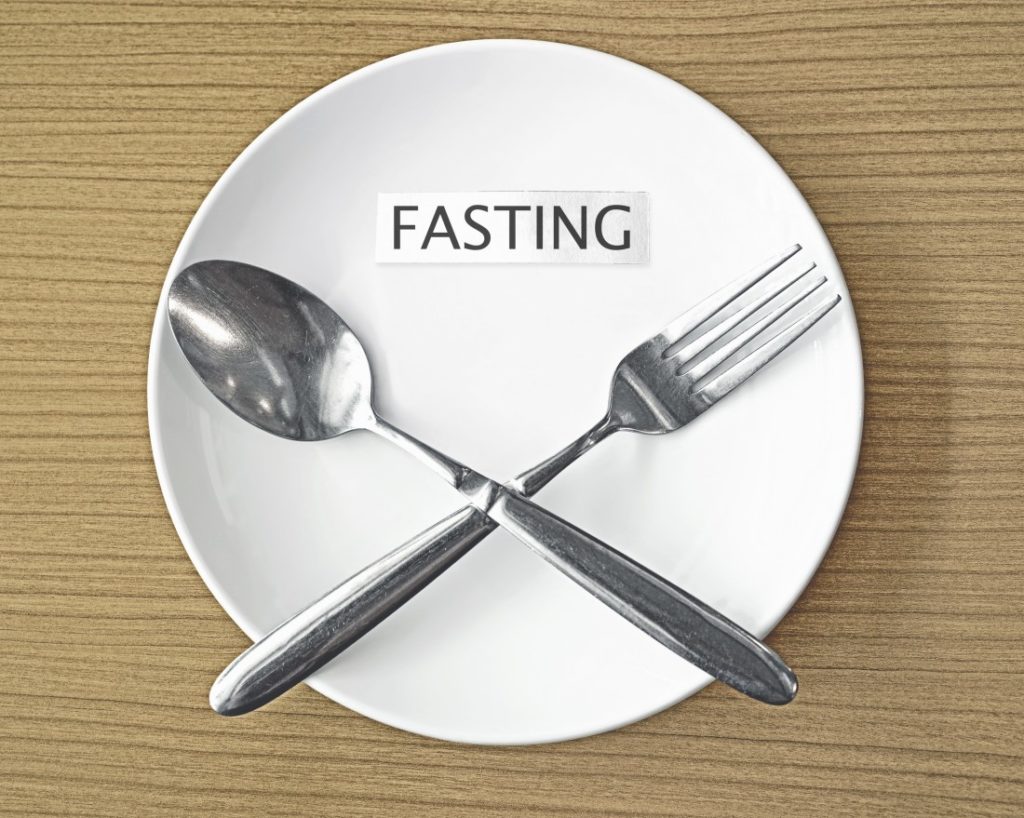
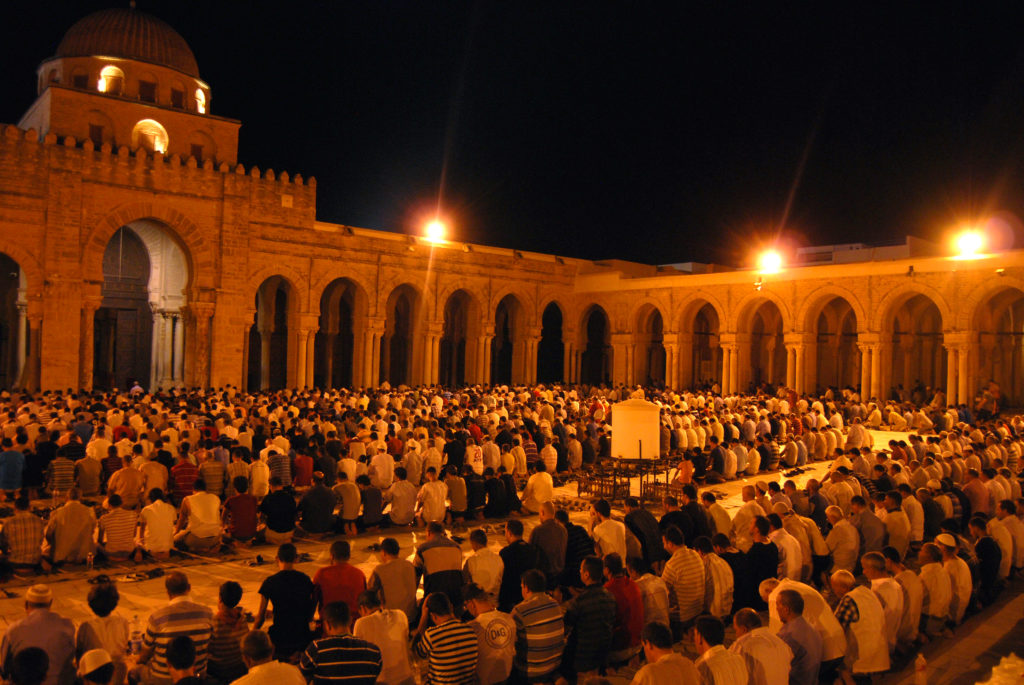
[Taraweeh and Qiyam Al-Layl]
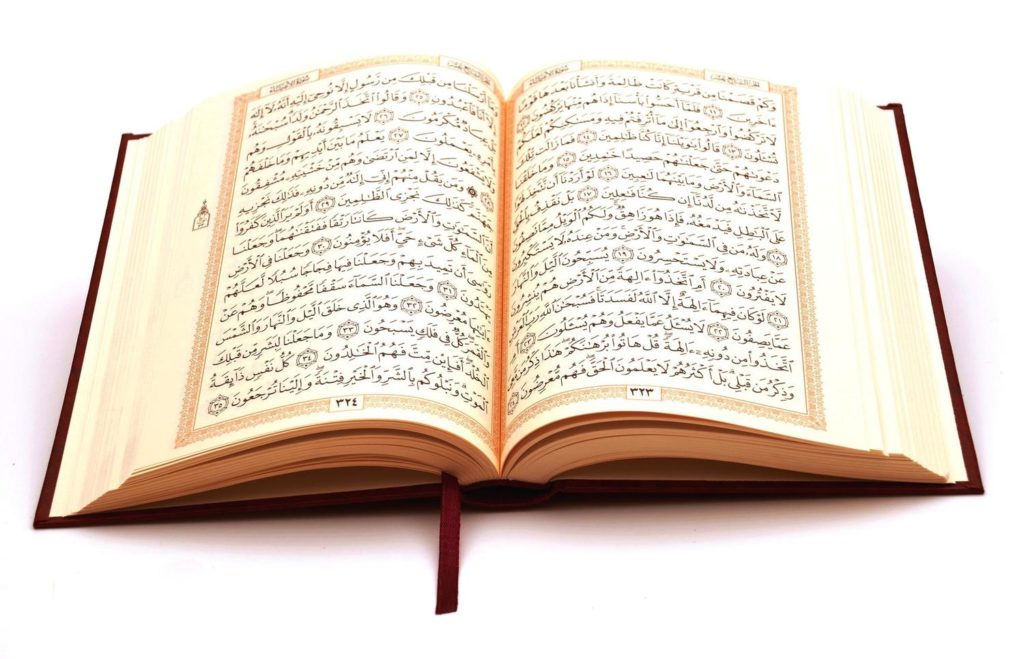

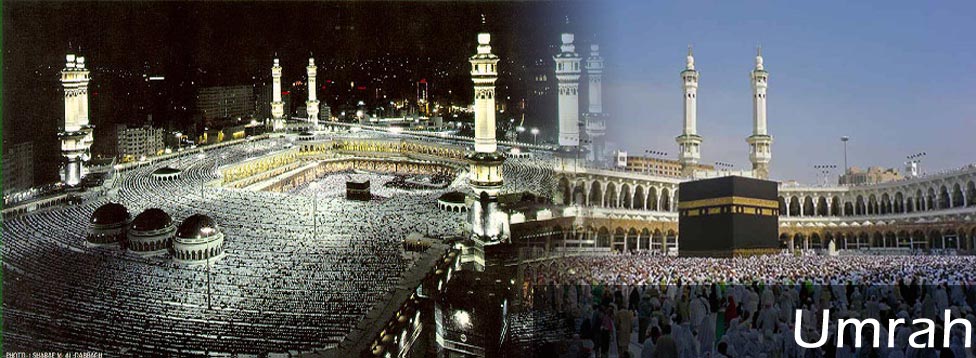



The best one being:
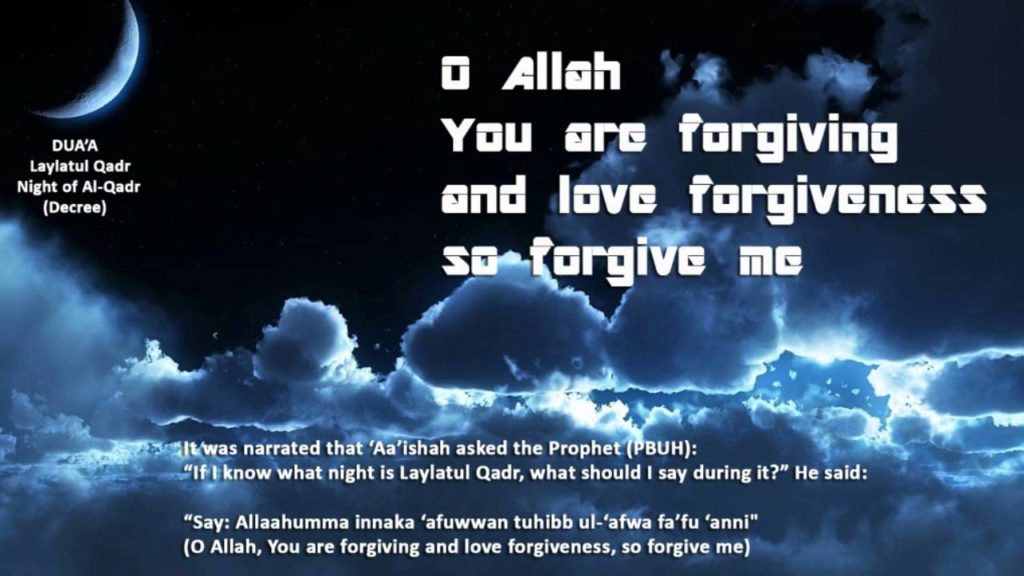
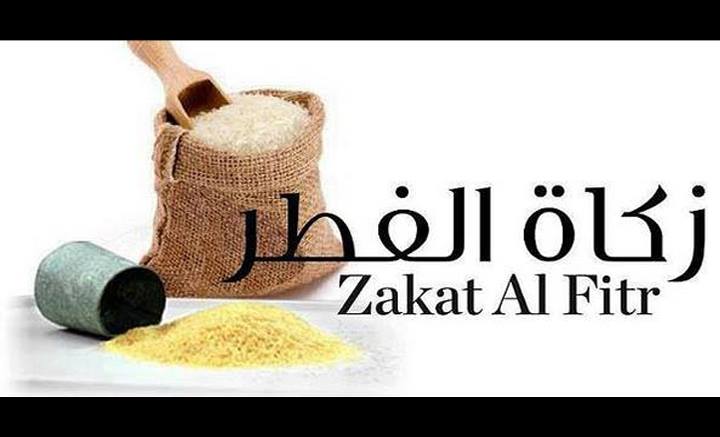
And now for the days that we are currently in:
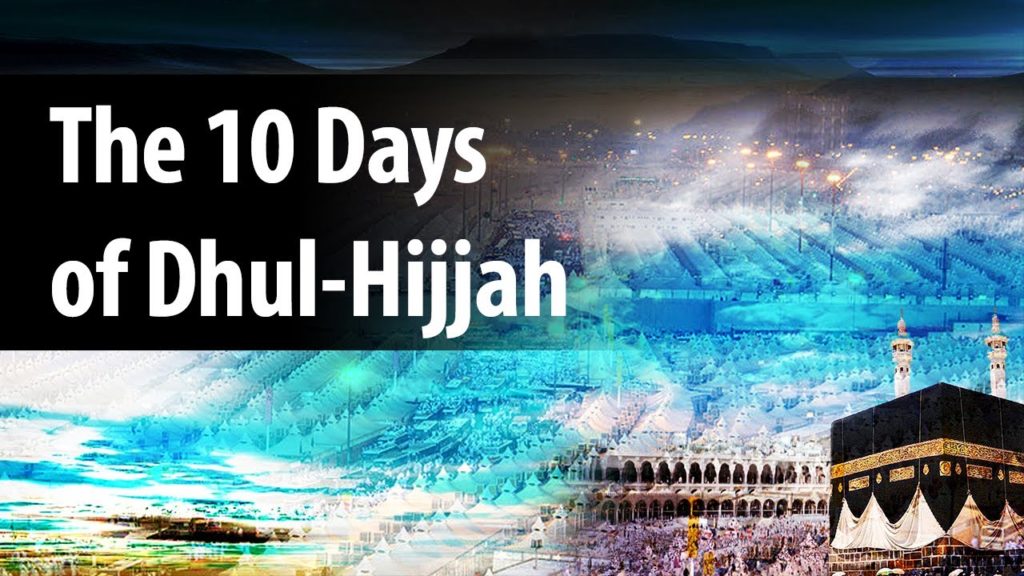
Reminder: Why do we push ourselves during the first ten days of Dhul Hijjah? Because they are the best days in the sight of Allah and deeds done in them are very beloved to Him.
The deeds done are:
[I’ll use the same pics as above to make it easier to compare.]



Just Qiyam Al-Layl (as Taraweeh is specific to Ramadan).

Especially on the Day of Arafah when the best dua is:
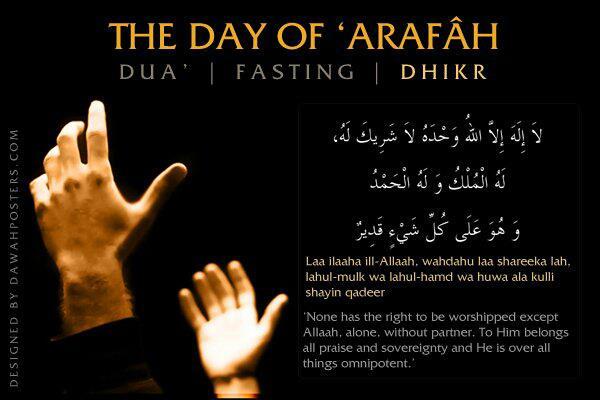

On the first ten days as well as the three days after it i.e. Days of Tashreeq.
The best one is the takbeer.


This can be done from after the Eid prayer on the 10th until Maghrib of the 13th.


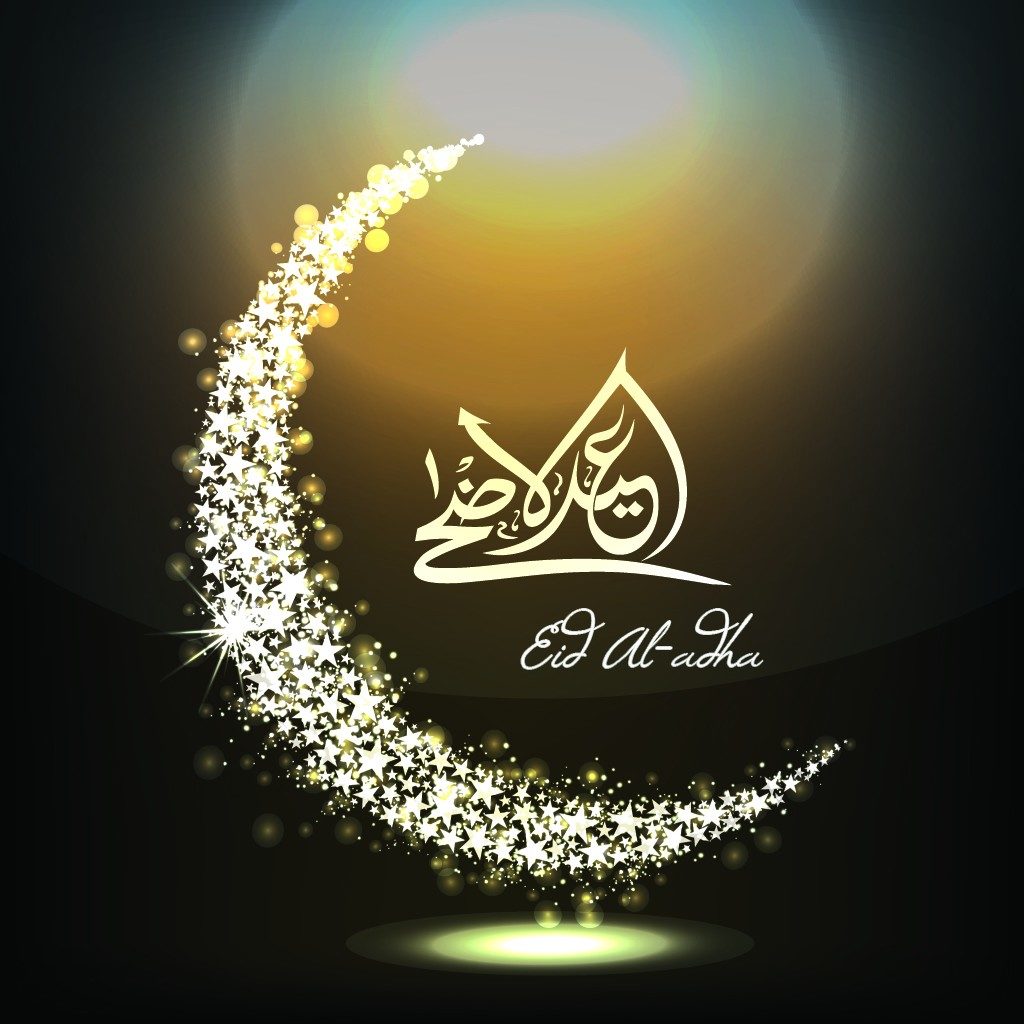
For those who want to know more about these ten days without have dozens of colourful pictures poking your eyes out, please read this excellent article: Virtues of the First Ten Days of Dhul Hijjah and Recommended Deeds to be Performed During Them
A final reminder: Paradise is not attained through wishful thinking.
لَّيْسَ بِأَمَانِيِّكُمْ وَلَا أَمَانِيِّ أَهْلِ الْكِتَابِ ۗ مَن يَعْمَلْ سُوءًا يُجْزَ بِهِ وَلَا يَجِدْ لَهُ مِن دُونِ اللَّـهِ وَلِيًّا وَلَا نَصِيرًا
“(Paradise) is not [obtained] by your wishful thinking nor by that of the People of the Scripture. Whoever does a wrong will be recompensed for it, and he will not find besides Allah a protector or a helper.” [Surah An-Nisaa (4) : 123]

